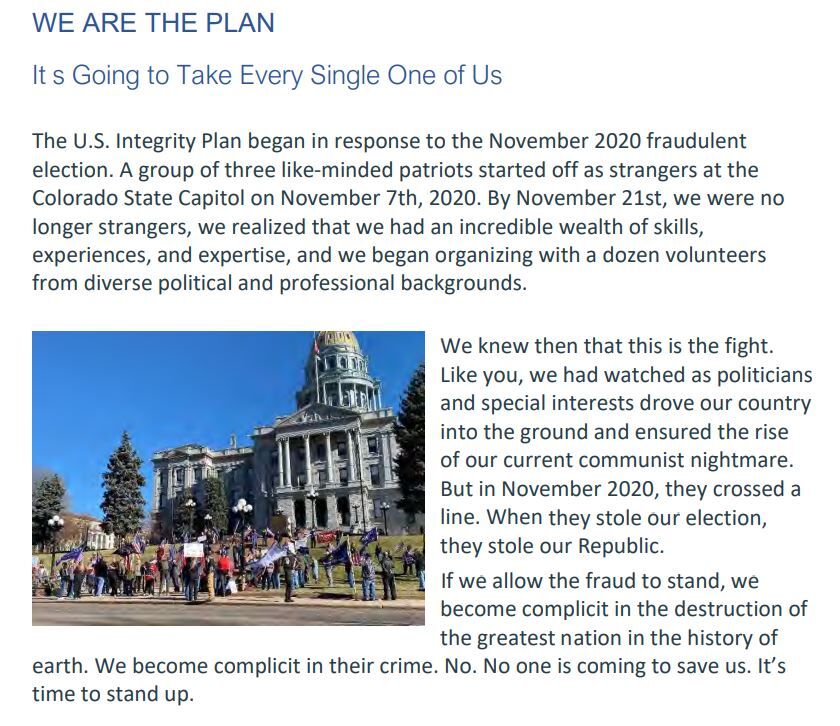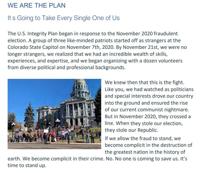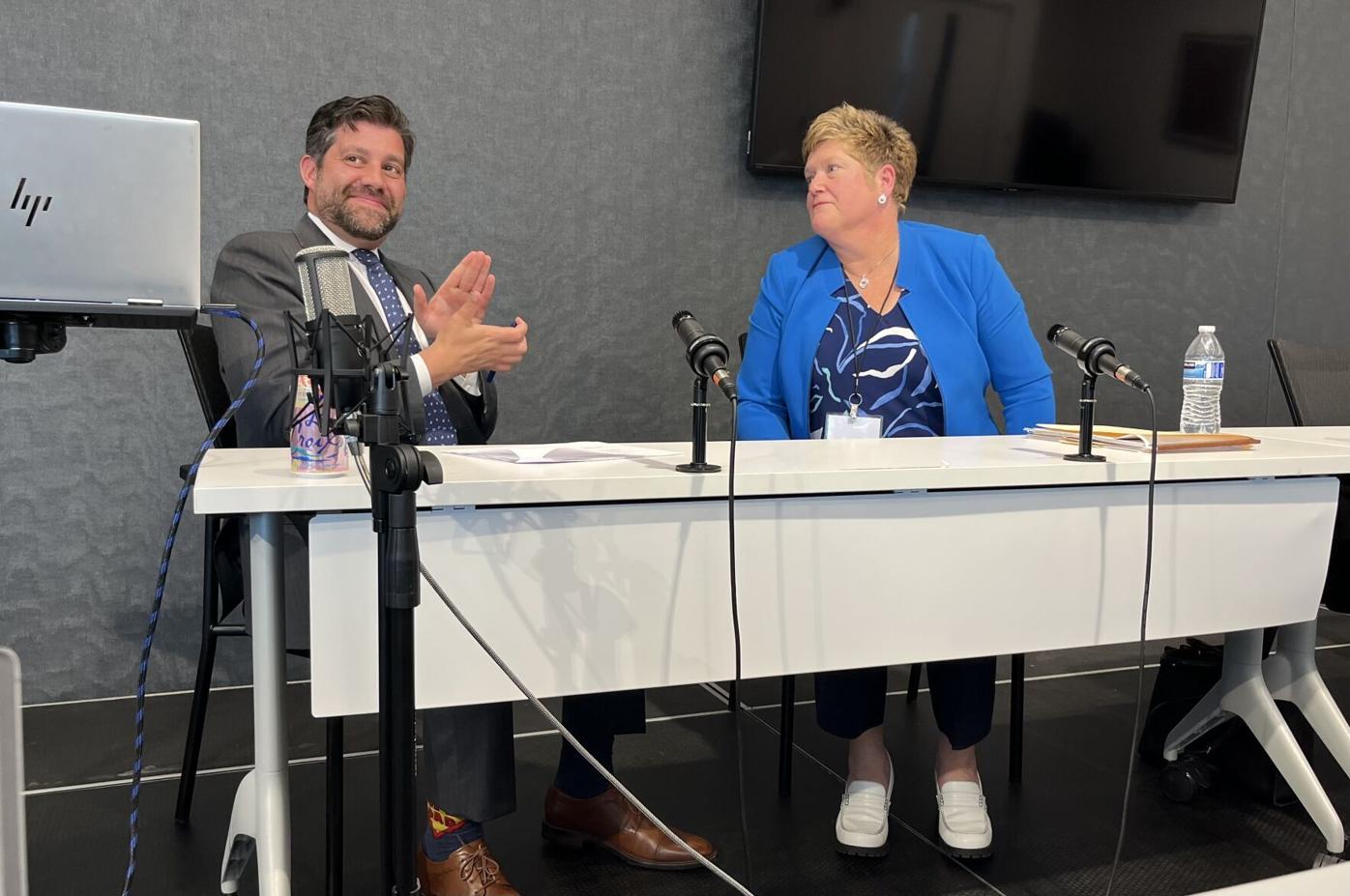Federal judge finds no Colorado voter intimidation by ‘election integrity’ organizers
A federal judge on Thursday concluded three civic organizations failed to provide evidence that the leaders of an “election integrity” effort illegally intimidated Colorado voters through a door-to-door canvassing project to search for election fraud in the wake of the 2020 presidential race.
After three days of testimony, U.S. District Court Judge Charlotte N. Sweeney granted the motion to end the case after noting both sides seemingly wanted to litigate matters beyond the narrow question she had to decide.
“It is not about the Jan. 6 insurrection or the history of voter intimidation in this country. It is not about the defendants’ collective belief about election fraud. It’s not about the security or lack of security of elections in Colorado,” said Sweeney, an appointee of President Joe Biden. “It is certainly not about who is paying for this litigation for any party. Those are sideshows and I was trying to reel those sideshows in.”
The plaintiff groups — the Colorado Montana Wyoming State Area Conference of the NAACP, the League of Women Voters of Colorado, and Mi Familia Vota — sued the founders of U.S. Election Integrity Plan (USEIP), which was an organized effort following the 2020 election to visit voters at more than 9,400 homes to inquire about their registrations and past voting behavior.
The defendants characterized the canvassing effort as “the equivalent to a high school civics project,” but the plaintiffs maintained the purpose was not benign. They pointed to USEIP’s “playbook,” published in August 2021 at the tail end of the door-knocking project, which claimed “they stole our election” and warned about “the destruction of the greatest nation in the history of earth.”

An excerpt from the August 2021 "playbook" published by U.S. Election Integrity Plan.


An excerpt from the August 2021 “playbook” published by U.S. Election Integrity Plan.
Sweeney found nothing intimidating about the documents USEIP produced.
“Does the manual provide hyperbole or false information? Maybe. But that is not the question before this court,” she said.
Testimony established the three defendants — Shawn Smith, Ashley Epp and Holly Kasun — were “core members” of USEIP. Smith said publicly that those who are adjudicated of election fraud “deserve to hang” and Epp testified that “the enemy is those involved in election fraud.” There has been no documented existence of widespread election fraud following the 2020 election.
Media reports about USEIP’s 2021 canvassing effort depicted volunteers as planning to take pictures of voters’ homes and in some cases carrying weapons. Beth Hendrix, executive director of the League of Women Voters of Colorado, testified her organization was prompted to file suit largely due to those reports.
However, Sweeney explained in her ruling how the plaintiffs’ case fell apart due to insufficient evidence. She could not find the defendants liable for voter intimidation based on media articles, she noted, and the trial featured the absence of any voter claiming USEIP’s canvassers threatened them.
The plaintiffs’ key witness, Grand Junction resident Yvette Roberts, spoke about two canvassers with homemade badges coming to her home in June 2021 to ask how many people lived in her house and how she cast her ballot. She said she felt intimidated and asked the canvassers to leave, which they did.
Sweeney said she originally green-lit the matter for trial in 2023 because she relied on Roberts’ written declaration that USEIP was responsible for sending the canvassers. But on cross-examination, Roberts admitted she did not know whether the canvassers were affiliated with USEIP.
Sweeney also called out the plaintiffs for attempting on the second day of trial to reframe the narrative to allege elections workers were actually the intimidated parties.
“Plaintiffs attempted to broaden the theory of the case midstream. I did not allow that,” she said.

Attorney David Gartenberg applauds for U.S. District Court Judge Charlotte N. Sweeney at a legal event in Denver on July 21, 2023.
Michael Karlik michael.karlik@coloradopolitics.com


Attorney David Gartenberg applauds for U.S. District Court Judge Charlotte N. Sweeney at a legal event in Denver on July 21, 2023.
Michael Karlik
michael.karlik@coloradopolitics.com
Sweeney noted that other cases involving voter intimidation contained circumstances unlike the USEIP initiative — following people into polling places or surveilling drop boxes, for example, which did result in judicial intervention.
“The court has no doubt that voter intimidation efforts … occurred in this country and continue to occur in this country. But the court cannot conclude defendants were part of that effort without sufficient evidence,” she said. “There was no evidence of voter intimidation, but simply a risk of voter intimidation. This court will not act on risk that was proven unfounded.”
“We are disappointed in this ruling and are exploring all appeal options,” said attorney Courtney Hostetler of Free Speech For People, an out-of-state advocacy group that helped bring the lawsuit.
Kasun called the ruling a “COMPLETE and TOTAL VINDICATION” on her X account.
The case is Colorado Montana Wyoming State Area Conference of the NAACP et al. v. Smith et al.
Denver News, Sports & Business | Denver Gazette
Amid summer doldrums, Denver housing market sees prices drop
Mark Samuelson
mark-samuelson@midtc.com
Updated 17 hours ago
1 of 4A home in Greenwood Village that sold over list price last month. “The ones in good shape are getting picked off,” said listing agent Jennifer Markus. Credit Kentwood DTCKentwood DTC2 of 4A home in Greenwood Village that sold...
Mark Samuelson
Reporter
Denver News, Sports & Business | Denver Gazette
With help from two veterans, improvement of Broncos linebacker Levelle Bailey has been ‘night and day’
Chris Tomasson
chris-tomasson@midtc.com
Updated 5 days ago
1 of 2Broncos linebacker Levelle Bailey after training camp practice on Friday, Aug. 1 at Broncos Park in Englewood. (Chris Tomasson/The Denver Gazette)Chris Tomasson chris.tomasson@gazette.com2 of 2Denver Broncos linebacker Levelle Bailey (56) during the second half of an NFL football...
Chris Tomasson
Reporter
Denver News, Sports & Business | Denver Gazette
PHOTOS: Broncos Training Camp Week 2
Stephen Swofford
stephen-swofford@midtc.com
Updated 5 days ago
[inline_gallery image_url=”aHR0cHM6Ly9ibG94aW1hZ2VzLm5ld3lvcmsxLnZpcC50b3dubmV3cy5jb20vZGVudmVyZ2F6ZXR0ZS5jb20vY29udGVudC90bmNtcy9hc3NldHMvdjMvZWRpdG9yaWFsLzEvMzEvMTMxZDkzM2MtNGY5NS00Y2YzLTg4ZmItODRjODhkYzAyOGI3LzY4OGQxY2VjYWZkNDMuaW1hZ2UuanBn” caption_text=”PHNwYW4gY2xhc3M9ImNhcHRpb24tdGV4dCI+CjxwPkJyb25jb3MgVGlnaHQgRW5kIEx1Y2FzIEtydWxsIHdhcm1zIHVwIGJlZm9yZSB0aGUgc3RhcnQgb2YgcHJhY3RpY2UgZHVyaW5nIEJyb25jb3MgdHJhaW5pbmcgY2FtcCBvbiBGcmlkYXksIEF1Zy4gMSwgMjAyNSAoU3RlcGhlbiBTd29mZm9yZCwgRGVudmVyIEdhemV0dGUpPC9wPgo8L3NwYW4+CjxzcGFuIGNsYXNzPSJjcmVkaXQiPgo8c3BhbiBjbGFzcz0idG50LWJ5bGluZSBhc3NldC1ieWxpbmUiIGlkPSJhdXRob3ItODJiNjU3YWEtMTkyNC0xMWVmLWE1MDgtOGJmYzUyMDJmNzEzLWFzc2V0LTEzMWQ5MzNjLTRmOTUtNGNmMy04OGZiLTg0Yzg4ZGMwMjhiNyI+PGEgaHJlZj0iaHR0cHM6Ly9kZW52ZXJnYXpldHRlLmNvbS91c2Vycy9wcm9maWxlL1N0ZXBoZW4lMjBTd29mZm9yZCIgcmVsPSJhdXRob3IiPlN0ZXBoZW4gU3dvZmZvcmQ8L2E+PC9zcGFuPgo8L3NwYW4+CjxzcGFuIGNsYXNzPSJjbGVhcmZpeCI+PC9zcGFuPg==”] [inline_gallery image_url=”aHR0cHM6Ly9ibG94aW1hZ2VzLm5ld3lvcmsxLnZpcC50b3dubmV3cy5jb20vZGVudmVyZ2F6ZXR0ZS5jb20vY29udGVudC90bmNtcy9hc3NldHMvdjMvZWRpdG9yaWFsLzEvMzMvMTMzZGUzOGMtMjRjNy00ODU1LTgwNTMtMmFiOTlhYmQ1N2FkLzY4OGQxY2M5NTlkNGQuaW1hZ2UuanBn” caption_text=”PHNwYW4gY2xhc3M9ImNhcHRpb24tdGV4dCI+CjxwPk5ld2x5IHNpZ25lZCBCcm9uY29zIExpbmViYWNrZXIgR2FycmV0dCBOZWxzb24gc3RyZXRjaGVzIGJlZm9yZSB0aGUgc3RhcnQgb2YgcHJhY3RpY2UgZHVyaW5nIEJyb25jb3MgVHJhaW5pbmcgQ2FtcCBvbiBUaHVyc2RheSwgSnVseSAzMSwgMjAyNS4gKFN0ZXBoZW4gU3dvZmZvcmQsIERlbnZlciBHYXpldHRlKTwvcD4KPC9zcGFuPgo8c3BhbiBjbGFzcz0iY3JlZGl0Ij4KPHNwYW4gY2xhc3M9InRudC1ieWxpbmUgYXNzZXQtYnlsaW5lIiBpZD0iYXV0aG9yLTgyYjY1N2FhLTE5MjQtMTFlZi1hNTA4LThiZmM1MjAyZjcxMy1hc3NldC0xMzNkZTM4Yy0yNGM3LTQ4NTUtODA1My0yYWI5OWFiZDU3YWQiPjxhIGhyZWY9Imh0dHBzOi8vZGVudmVyZ2F6ZXR0ZS5jb20vdXNlcnMvcHJvZmlsZS9TdGVwaGVuJTIwU3dvZmZvcmQiIHJlbD0iYXV0aG9yIj5TdGVwaGVuIFN3b2Zmb3JkPC9hPjwvc3Bhbj4KPC9zcGFuPgo8c3BhbiBjbGFzcz0iY2xlYXJmaXgiPjwvc3Bhbj4=”] [inline_gallery image_url=”aHR0cHM6Ly9ibG94aW1hZ2VzLm5ld3lvcmsxLnZpcC50b3dubmV3cy5jb20vZGVudmVyZ2F6ZXR0ZS5jb20vY29udGVudC90bmNtcy9hc3NldHMvdjMvZWRpdG9yaWFsLzMvOWQvMzlkNTEyY2YtYmQ0ZS00ZWJmLTg2NDItNTU3M2YxMGU4MmVlLzY4OGQxY2ZlNjZmNjcuaW1hZ2UuanBn” caption_text=”PHNwYW4gY2xhc3M9ImNhcHRpb24tdGV4dCI+CjxwPkJyb25jb3MgU2FmZXR5IEJyYW5kb24gSm9uZXMgc3RyZXRjaGVzIGR1cmluZyB3YXJtIHVwcyBhdCBCcm9uY29zIHRyYWluaW5nIGNhbXAgb24gRnJpZGF5LCBBdWcuIDEsIDIwMjUgKFN0ZXBoZW4gU3dvZmZvcmQsIERlbnZlciBHYXpldHRlKTwvcD4KPC9zcGFuPgo8c3BhbiBjbGFzcz0iY3JlZGl0Ij4KPHNwYW4gY2xhc3M9InRudC1ieWxpbmUgYXNzZXQtYnlsaW5lIiBpZD0iYXV0aG9yLTgyYjY1N2FhLTE5MjQtMTFlZi1hNTA4LThiZmM1MjAyZjcxMy1hc3NldC0zOWQ1MTJjZi1iZDRlLTRlYmYtODY0Mi01NTczZjEwZTgyZWUiPjxhIGhyZWY9Imh0dHBzOi8vZGVudmVyZ2F6ZXR0ZS5jb20vdXNlcnMvcHJvZmlsZS9TdGVwaGVuJTIwU3dvZmZvcmQiIHJlbD0iYXV0aG9yIj5TdGVwaGVuIFN3b2Zmb3JkPC9hPjwvc3Bhbj4KPC9zcGFuPgo8c3BhbiBjbGFzcz0iY2xlYXJmaXgiPjwvc3Bhbj4=”] [inline_gallery image_url=”aHR0cHM6Ly9ibG94aW1hZ2VzLm5ld3lvcmsxLnZpcC50b3dubmV3cy5jb20vZGVudmVyZ2F6ZXR0ZS5jb20vY29udGVudC90bmNtcy9hc3NldHMvdjMvZWRpdG9yaWFsLzQvYzMvNGMzNjZkYjMtMGEwNy00NzJlLWJjYTQtMzM4MDBhNDcwMzYwLzY4OGQxZDFiYWZkNGYuaW1hZ2UuanBn” caption_text=”PHNwYW4gY2xhc3M9ImNhcHRpb24tdGV4dCI+CjxwPkJyb25jb3MgU2FmZXR5IFRhbGFub2EgSHVmYW5nYSBwdXRzIG9uIGhpcyBoZWxtZXQgYWZ0ZXIgd2FybSB1cHMgZHVyaW5nIEJyb25jb3MgdHJhaW5pbmcgY2FtcCBvbiBGcmlkYXksIEF1Zy4gMSwgMjAyNSAoU3RlcGhlbiBTd29mZm9yZCwgRGVudmVyIEdhemV0dGUpPC9wPgo8L3NwYW4+CjxzcGFuIGNsYXNzPSJjcmVkaXQiPgo8c3BhbiBjbGFzcz0idG50LWJ5bGluZSBhc3NldC1ieWxpbmUiIGlkPSJhdXRob3ItODJiNjU3YWEtMTkyNC0xMWVmLWE1MDgtOGJmYzUyMDJmNzEzLWFzc2V0LTRjMzY2ZGIzLTBhMDctNDcyZS1iY2E0LTMzODAwYTQ3MDM2MCI+PGEgaHJlZj0iaHR0cHM6Ly9kZW52ZXJnYXpldHRlLmNvbS91c2Vycy9wcm9maWxlL1N0ZXBoZW4lMjBTd29mZm9yZCIgcmVsPSJhdXRob3IiPlN0ZXBoZW4gU3dvZmZvcmQ8L2E+PC9zcGFuPgo8L3NwYW4+CjxzcGFuIGNsYXNzPSJjbGVhcmZpeCI+PC9zcGFuPg==”] [inline_gallery image_url=”aHR0cHM6Ly9ibG94aW1hZ2VzLm5ld3lvcmsxLnZpcC50b3dubmV3cy5jb20vZGVudmVyZ2F6ZXR0ZS5jb20vY29udGVudC90bmNtcy9hc3NldHMvdjMvZWRpdG9yaWFsLzYvMjIvNjIyNmFlYmItZmIxZS00ZTQ4LWFlNjUtOGE1OTdmM2M3NTMyLzY4OGQxY2IxYTlmMmIuaW1hZ2UuanBn” caption_text=”PHNwYW4gY2xhc3M9ImNhcHRpb24tdGV4dCI+CjxwPkJyb25jb3MgV2lkZSBSZWNlaXZlciBLeXJlc2UgV2hpdGUgY2F0Y2hlcyBhIGJhbGwgYXMgaGUgd2FybXMgdXAgYmVmb3JlIHRoZSBzdGFydCBvZiBwcmFjdGljZSBkdXJpbmcgQnJvbmNvcyBUcmFpbmluZyBDYW1wIG9uIFRodXJzZGF5LCBKdWx5IDMxLCAyMDI1IChTdGVwaGVuIFN3b2Zmb3JkLCBEZW52ZXIgR2F6ZXR0ZSk8L3A+Cjwvc3Bhbj4KPHNwYW4gY2xhc3M9ImNyZWRpdCI+CjxzcGFuIGNsYXNzPSJ0bnQtYnlsaW5lIGFzc2V0LWJ5bGluZSIgaWQ9ImF1dGhvci04MmI2NTdhYS0xOTI0LTExZWYtYTUwOC04YmZjNTIwMmY3MTMtYXNzZXQtNjIyNmFlYmItZmIxZS00ZTQ4LWFlNjUtOGE1OTdmM2M3NTMyIj48YSBocmVmPSJodHRwczovL2RlbnZlcmdhemV0dGUuY29tL3VzZXJzL3Byb2ZpbGUvU3RlcGhlbiUyMFN3b2Zmb3JkIiByZWw9ImF1dGhvciI+U3RlcGhlbiBTd29mZm9yZDwvYT48L3NwYW4+Cjwvc3Bhbj4KPHNwYW4gY2xhc3M9ImNsZWFyZml4Ij48L3NwYW4+”] [inline_gallery image_url=”aHR0cHM6Ly9ibG94aW1hZ2VzLm5ld3lvcmsxLnZpcC50b3dubmV3cy5jb20vZGVudmVyZ2F6ZXR0ZS5jb20vY29udGVudC90bmNtcy9hc3NldHMvdjMvZWRpdG9yaWFsLzYvZDEvNmQxNmZlNDUtOTE5MC00ZDg5LTlkOGYtZWU0ZDlhMjNlMjQ0LzY4OGQxZDA5MjkxNDEuaW1hZ2UuanBn” caption_text=”PHNwYW4gY2xhc3M9ImNhcHRpb24tdGV4dCI+CjxwPkJyb25jb3MgV2lkZSBSZWNlaXZlciBUcmVudCBTaGVyZmllbGQgU3IuIG1pc3NlcyBhIGNhdGNoIGR1cmluZyBCcm9uY29zIHRyYWluaW5nIGNhbXAgb24gRnJpZGF5LCBBdWcuIDEsIDIwMjUgKFN0ZXBoZW4gU3dvZmZvcmQsIERlbnZlciBHYXpldHRlKTwvcD4KPC9zcGFuPgo8c3BhbiBjbGFzcz0iY3JlZGl0Ij4KPHNwYW4gY2xhc3M9InRudC1ieWxpbmUgYXNzZXQtYnlsaW5lIiBpZD0iYXV0aG9yLTgyYjY1N2FhLTE5MjQtMTFlZi1hNTA4LThiZmM1MjAyZjcxMy1hc3NldC02ZDE2ZmU0NS05MTkwLTRkODktOWQ4Zi1lZTRkOWEyM2UyNDQiPjxhIGhyZWY9Imh0dHBzOi8vZGVudmVyZ2F6ZXR0ZS5jb20vdXNlcnMvcHJvZmlsZS9TdGVwaGVuJTIwU3dvZmZvcmQiIHJlbD0iYXV0aG9yIj5TdGVwaGVuIFN3b2Zmb3JkPC9hPjwvc3Bhbj4KPC9zcGFuPgo8c3BhbiBjbGFzcz0iY2xlYXJmaXgiPjwvc3Bhbj4=”] [inline_gallery image_url=”aHR0cHM6Ly9ibG94aW1hZ2VzLm5ld3lvcmsxLnZpcC50b3dubmV3cy5jb20vZGVudmVyZ2F6ZXR0ZS5jb20vY29udGVudC90bmNtcy9hc3NldHMvdjMvZWRpdG9yaWFsLzcvOTIvNzkyOGVkNTktZmM3Ny00YjdiLWE2ZmItMjBkYzI4MGQ4YTYyLzY4OGQxY2YxZDA0ZGMuaW1hZ2UuanBn” caption_text=”PHNwYW4gY2xhc3M9ImNhcHRpb24tdGV4dCI+CjxwPkJyb25jb3MgSW5zaWRlIExpbmViYWNrZXIgSnVzdGluIFN0cm5hZCBzdHJldGNoZXMgZHVyaW5nIHdhcm0gdXBzIGF0IEJyb25jb3MgdHJhaW5pbmcgY2FtcCBvbiBGcmlkYXksIEF1Zy4gMSwgMjAyNSAoU3RlcGhlbiBTd29mZm9yZCwgRGVudmVyIEdhemV0dGUpPC9wPgo8L3NwYW4+CjxzcGFuIGNsYXNzPSJjcmVkaXQiPgo8c3BhbiBjbGFzcz0idG50LWJ5bGluZSBhc3NldC1ieWxpbmUiIGlkPSJhdXRob3ItODJiNjU3YWEtMTkyNC0xMWVmLWE1MDgtOGJmYzUyMDJmNzEzLWFzc2V0LTc5MjhlZDU5LWZjNzctNGI3Yi1hNmZiLTIwZGMyODBkOGE2MiI+PGEgaHJlZj0iaHR0cHM6Ly9kZW52ZXJnYXpldHRlLmNvbS91c2Vycy9wcm9maWxlL1N0ZXBoZW4lMjBTd29mZm9yZCIgcmVsPSJhdXRob3IiPlN0ZXBoZW4gU3dvZmZvcmQ8L2E+PC9zcGFuPgo8L3NwYW4+CjxzcGFuIGNsYXNzPSJjbGVhcmZpeCI+PC9zcGFuPg==”] [inline_gallery image_url=”aHR0cHM6Ly9ibG94aW1hZ2VzLm5ld3lvcmsxLnZpcC50b3dubmV3cy5jb20vZGVudmVyZ2F6ZXR0ZS5jb20vY29udGVudC90bmNtcy9hc3NldHMvdjMvZWRpdG9yaWFsLzcvYjcvN2I3YjA0NTItNGEzNC00NzNjLTkwNDItZDA4MmNhYzUwYTgwLzY4OGQxZDNjMTIzNWMuaW1hZ2UuanBn” caption_text=”PHNwYW4gY2xhc3M9ImNhcHRpb24tdGV4dCI+CjxwPkJyb25jb3MgTGluZWJhY2tlciBEcmUgR3JlZW5sYXcgcnVucyBkcmlsbHMgZHVyaW5nIEJyb25jb3MgdHJhaW5pbmcgY2FtcCBvbiBGcmlkYXksIEF1Zy4gMSwgMjAyNSAoU3RlcGhlbiBTd29mZm9yZCwgRGVudmVyIEdhemV0dGUpPC9wPgo8L3NwYW4+CjxzcGFuIGNsYXNzPSJjcmVkaXQiPgo8c3BhbiBjbGFzcz0idG50LWJ5bGluZSBhc3NldC1ieWxpbmUiIGlkPSJhdXRob3ItODJiNjU3YWEtMTkyNC0xMWVmLWE1MDgtOGJmYzUyMDJmNzEzLWFzc2V0LTdiN2IwNDUyLTRhMzQtNDczYy05MDQyLWQwODJjYWM1MGE4MCI+PGEgaHJlZj0iaHR0cHM6Ly9kZW52ZXJnYXpldHRlLmNvbS91c2Vycy9wcm9maWxlL1N0ZXBoZW4lMjBTd29mZm9yZCIgcmVsPSJhdXRob3IiPlN0ZXBoZW4gU3dvZmZvcmQ8L2E+PC9zcGFuPgo8L3NwYW4+CjxzcGFuIGNsYXNzPSJjbGVhcmZpeCI+PC9zcGFuPg==”] [inline_gallery image_url=”aHR0cHM6Ly9ibG94aW1hZ2VzLm5ld3lvcmsxLnZpcC50b3dubmV3cy5jb20vZGVudmVyZ2F6ZXR0ZS5jb20vY29udGVudC90bmNtcy9hc3NldHMvdjMvZWRpdG9yaWFsLzkvOTAvOTkwMGY5NmItYTYxYy00NGM4LWFhMDQtZDUzMjZhMGNlMDcxLzY4OGQxY2Y4YzVhZGIuaW1hZ2UuanBn” caption_text=”PHNwYW4gY2xhc3M9ImNhcHRpb24tdGV4dCI+CjxwPkJyb25jb3MgRGVmZW5zaXZlIFRhY2tsZSBLcmlzdGlhbiBXaWxsaWFtcyBoeXBlcyB1cCB0aGUgY3Jvd2QgZHVyaW5nIEJyb25jb3MgdHJhaW5pbmcgY2FtcCBvbiBGcmlkYXksIEF1Zy4gMSwgMjAyNSAoU3RlcGhlbiBTd29mZm9yZCwgRGVudmVyIEdhemV0dGUpPC9wPgo8L3NwYW4+CjxzcGFuIGNsYXNzPSJjcmVkaXQiPgo8c3BhbiBjbGFzcz0idG50LWJ5bGluZSBhc3NldC1ieWxpbmUiIGlkPSJhdXRob3ItODJiNjU3YWEtMTkyNC0xMWVmLWE1MDgtOGJmYzUyMDJmNzEzLWFzc2V0LTk5MDBmOTZiLWE2MWMtNDRjOC1hYTA0LWQ1MzI2YTBjZTA3MSI+PGEgaHJlZj0iaHR0cHM6Ly9kZW52ZXJnYXpldHRlLmNvbS91c2Vycy9wcm9maWxlL1N0ZXBoZW4lMjBTd29mZm9yZCIgcmVsPSJhdXRob3IiPlN0ZXBoZW4gU3dvZmZvcmQ8L2E+PC9zcGFuPgo8L3NwYW4+CjxzcGFuIGNsYXNzPSJjbGVhcmZpeCI+PC9zcGFuPg==”] [inline_gallery image_url=”aHR0cHM6Ly9ibG94aW1hZ2VzLm5ld3lvcmsxLnZpcC50b3dubmV3cy5jb20vZGVudmVyZ2F6ZXR0ZS5jb20vY29udGVudC90bmNtcy9hc3NldHMvdjMvZWRpdG9yaWFsLzkvYzQvOWM0NTUzMjEtZGMyZS00YTQwLTlhYjktZjZlOGQ3ZDJiZDhjLzY4OGQxZDA0NDA2MzguaW1hZ2UuanBn” caption_text=”PHNwYW4gY2xhc3M9ImNhcHRpb24tdGV4dCI+CjxwPkJyb25jb3MgT2ZmZW5zaXZlIExpbmViYWNrZXIgTmlrIEJvbml0dG8gcnVucyBkcmlsbHMgZHVyaW5nIEJyb25jb3MgdHJhaW5pbmcgY2FtcCBvbiBGcmlkYXksIEF1Zy4gMSwgMjAyNSAoU3RlcGhlbiBTd29mZm9yZCwgRGVudmVyIEdhemV0dGUpPC9wPgo8L3NwYW4+CjxzcGFuIGNsYXNzPSJjcmVkaXQiPgo8c3BhbiBjbGFzcz0idG50LWJ5bGluZSBhc3NldC1ieWxpbmUiIGlkPSJhdXRob3ItODJiNjU3YWEtMTkyNC0xMWVmLWE1MDgtOGJmYzUyMDJmNzEzLWFzc2V0LTljNDU1MzIxLWRjMmUtNGE0MC05YWI5LWY2ZThkN2QyYmQ4YyI+PGEgaHJlZj0iaHR0cHM6Ly9kZW52ZXJnYXpldHRlLmNvbS91c2Vycy9wcm9maWxlL1N0ZXBoZW4lMjBTd29mZm9yZCIgcmVsPSJhdXRob3IiPlN0ZXBoZW4gU3dvZmZvcmQ8L2E+PC9zcGFuPgo8L3NwYW4+CjxzcGFuIGNsYXNzPSJjbGVhcmZpeCI+PC9zcGFuPg==”] [inline_gallery image_url=”aHR0cHM6Ly9ibG94aW1hZ2VzLm5ld3lvcmsxLnZpcC50b3dubmV3cy5jb20vZGVudmVyZ2F6ZXR0ZS5jb20vY29udGVudC90bmNtcy9hc3NldHMvdjMvZWRpdG9yaWFsL2EvMDYvYTA2MTdiMDAtODFhZi00YmIxLWE3MjUtMGNjNmZmMWEyZmE4LzY4OGQxZDM3Mzc3ODIuaW1hZ2UuanBn” caption_text=”PHNwYW4gY2xhc3M9ImNhcHRpb24tdGV4dCI+CjxwPkJyb25jb3MgRGVmZW5zaXZlIGxpbmVtYW4gRXlpb21hIFV3YXp1cmlrZSBydW5zIGRyaWxscyBkdXJpbmcgQnJvbmNvcyB0cmFpbmluZyBjYW1wIG9uIEZyaWRheSwgQXVnLiAxLCAyMDI1IChTdGVwaGVuIFN3b2Zmb3JkLCBEZW52ZXIgR2F6ZXR0ZSk8L3A+Cjwvc3Bhbj4KPHNwYW4gY2xhc3M9ImNyZWRpdCI+CjxzcGFuIGNsYXNzPSJ0bnQtYnlsaW5lIGFzc2V0LWJ5bGluZSIgaWQ9ImF1dGhvci04MmI2NTdhYS0xOTI0LTExZWYtYTUwOC04YmZjNTIwMmY3MTMtYXNzZXQtYTA2MTdiMDAtODFhZi00YmIxLWE3MjUtMGNjNmZmMWEyZmE4Ij48YSBocmVmPSJodHRwczovL2RlbnZlcmdhemV0dGUuY29tL3VzZXJzL3Byb2ZpbGUvU3RlcGhlbiUyMFN3b2Zmb3JkIiByZWw9ImF1dGhvciI+U3RlcGhlbiBTd29mZm9yZDwvYT48L3NwYW4+Cjwvc3Bhbj4KPHNwYW4gY2xhc3M9ImNsZWFyZml4Ij48L3NwYW4+”] [inline_gallery image_url=”aHR0cHM6Ly9ibG94aW1hZ2VzLm5ld3lvcmsxLnZpcC50b3dubmV3cy5jb20vZGVudmVyZ2F6ZXR0ZS5jb20vY29udGVudC90bmNtcy9hc3NldHMvdjMvZWRpdG9yaWFsL2EvYjQvYWI0MzFhMTktNGNkZi00ZTEyLTlkMTUtZGYwMmZkZDMwMjJmLzY4OGQxY2FlNTY0Y2UuaW1hZ2UuanBn” caption_text=”PHNwYW4gY2xhc3M9ImNhcHRpb24tdGV4dCI+CjxwPkNvbnN0cnVjdGlvbiBjcmV3cyBsb3dlciB0aGUgbGFzdCByb29mIHBhbmVsIGludG8gcGxhY2Ugb24gdGhlIG5ldyBicm9uY29zIHRyYWluaW5nIGZhY2lsaXR5IGR1cmluZyBhIGNlcmVtb255IG9uIEZyaWRheSwgQXVnLiAxLCAyMDI1IChTdGVwaGVuIFN3b2Zmb3JkLCBEZW52ZXIgR2F6ZXR0ZSk8L3A+Cjwvc3Bhbj4KPHNwYW4gY2xhc3M9ImNyZWRpdCI+CjxzcGFuIGNsYXNzPSJ0bnQtYnlsaW5lIGFzc2V0LWJ5bGluZSIgaWQ9ImF1dGhvci04MmI2NTdhYS0xOTI0LTExZWYtYTUwOC04YmZjNTIwMmY3MTMtYXNzZXQtYWI0MzFhMTktNGNkZi00ZTEyLTlkMTUtZGYwMmZkZDMwMjJmIj48YSBocmVmPSJodHRwczovL2RlbnZlcmdhemV0dGUuY29tL3VzZXJzL3Byb2ZpbGUvU3RlcGhlbiUyMFN3b2Zmb3JkIiByZWw9ImF1dGhvciI+U3RlcGhlbiBTd29mZm9yZDwvYT48L3NwYW4+Cjwvc3Bhbj4KPHNwYW4gY2xhc3M9ImNsZWFyZml4Ij48L3NwYW4+”] [inline_gallery image_url=”aHR0cHM6Ly9ibG94aW1hZ2VzLm5ld3lvcmsxLnZpcC50b3dubmV3cy5jb20vZGVudmVyZ2F6ZXR0ZS5jb20vY29udGVudC90bmNtcy9hc3NldHMvdjMvZWRpdG9yaWFsL2QvZTUvZGU1Y2Y1ODEtMTgwMy00YWRjLTkyODEtMzRhMTM1MGFjODU0LzY4OGQxZDE2N2IxNGQuaW1hZ2UuanBn” caption_text=”PHNwYW4gY2xhc3M9ImNhcHRpb24tdGV4dCI+CjxwPkJyb25jb3MgQ2VudGVyIEx1a2UgV2F0dGVuYmVyZywgbGVmdCwgYW5kIEd1YXJkIENsYXkgV2ViYiBydW4gYSBkcmlsbCBkdXJpbmcgQnJvbmNvcyB0cmFpbmluZyBjYW1wIG9uIEZyaWRheSwgQXVnLiAxLCAyMDI1IChTdGVwaGVuIFN3b2Zmb3JkLCBEZW52ZXIgR2F6ZXR0ZSk8L3A+Cjwvc3Bhbj4KPHNwYW4gY2xhc3M9ImNyZWRpdCI+CjxzcGFuIGNsYXNzPSJ0bnQtYnlsaW5lIGFzc2V0LWJ5bGluZSIgaWQ9ImF1dGhvci04MmI2NTdhYS0xOTI0LTExZWYtYTUwOC04YmZjNTIwMmY3MTMtYXNzZXQtZGU1Y2Y1ODEtMTgwMy00YWRjLTkyODEtMzRhMTM1MGFjODU0Ij48YSBocmVmPSJodHRwczovL2RlbnZlcmdhemV0dGUuY29tL3VzZXJzL3Byb2ZpbGUvU3RlcGhlbiUyMFN3b2Zmb3JkIiByZWw9ImF1dGhvciI+U3RlcGhlbiBTd29mZm9yZDwvYT48L3NwYW4+Cjwvc3Bhbj4KPHNwYW4gY2xhc3M9ImNsZWFyZml4Ij48L3NwYW4+”] [inline_gallery...
Stephen Swofford
Reporter
Denver News, Sports & Business | Denver Gazette
PHOTOS: Broncos invite fans to the stands for Training Camp
Stephen Swofford
stephen-swofford@midtc.com
Updated 2 weeks ago
[inline_gallery image_url=”aHR0cHM6Ly9ibG94aW1hZ2VzLm5ld3lvcmsxLnZpcC50b3dubmV3cy5jb20vZGVudmVyZ2F6ZXR0ZS5jb20vY29udGVudC90bmNtcy9hc3NldHMvdjMvZWRpdG9yaWFsLzQvYmUvNGJlNGRiMjMtMGNiMy00MDBiLTg1MGUtMGFjY2JmOGU1M2MzLzY4ODNmMDQ3NDk2YmEuaW1hZ2UuanBn” caption_text=”PHNwYW4gY2xhc3M9ImNhcHRpb24tdGV4dCI+CjxwPkJyb25jb3MgRGVmZW5zaXZlIFRhY2tsZSBLcmlzdGlhbiBXaWxsaWFtcyB0YWxrcyB3aXRoIGZhbnMgYXMgaGUgYXV0b2dyYXBocyBtZW1vcmFiaWxpYSBhZnRlciBwcmFjdGljZSBkdXJpbmcgdHJhaW5pbmcgY2FtcCBvbiBGcmlkYXksIEp1bHkgMjUsIDIwMjUuIChTdGVwaGVuIFN3b2Zmb3JkLCBEZW52ZXIgR2F6ZXR0ZSk8L3A+Cjwvc3Bhbj4KPHNwYW4gY2xhc3M9ImNyZWRpdCI+CjxzcGFuIGNsYXNzPSJ0bnQtYnlsaW5lIGFzc2V0LWJ5bGluZSIgaWQ9ImF1dGhvci04MmI2NTdhYS0xOTI0LTExZWYtYTUwOC04YmZjNTIwMmY3MTMtYXNzZXQtNGJlNGRiMjMtMGNiMy00MDBiLTg1MGUtMGFjY2JmOGU1M2MzIj48YSBocmVmPSJodHRwczovL2RlbnZlcmdhemV0dGUuY29tL3VzZXJzL3Byb2ZpbGUvU3RlcGhlbiUyMFN3b2Zmb3JkIiByZWw9ImF1dGhvciI+U3RlcGhlbiBTd29mZm9yZDwvYT48L3NwYW4+Cjwvc3Bhbj4KPHNwYW4gY2xhc3M9ImNsZWFyZml4Ij48L3NwYW4+”] [inline_gallery image_url=”aHR0cHM6Ly9ibG94aW1hZ2VzLm5ld3lvcmsxLnZpcC50b3dubmV3cy5jb20vZGVudmVyZ2F6ZXR0ZS5jb20vY29udGVudC90bmNtcy9hc3NldHMvdjMvZWRpdG9yaWFsLzUvNjAvNTYwNTZlZjQtNzI1Ni00NjIzLWFmZmQtNmY2NjY2ZmMyMGEwLzY4ODNmMDZkYTBkOGQuaW1hZ2UuanBn” caption_text=”PHNwYW4gY2xhc3M9ImNhcHRpb24tdGV4dCI+CjxwPkJyb25jb3MgUnVubmluZ2JhY2sgSmFsZWVsIE1jTGF1Z2hsaW4gY2F0Y2hlcyB0aGUgYmFsbCBhcyBoZSBydW5zIGRyaWxscyBkdXJpbmcgdHJhaW5pbmcgY2FtcCBvbiBGcmlkYXksIEp1bHkgMjUsIDIwMjUuIChTdGVwaGVuIFN3b2Zmb3JkLCBEZW52ZXIgR2F6ZXR0ZSk8L3A+Cjwvc3Bhbj4KPHNwYW4gY2xhc3M9ImNyZWRpdCI+CjxzcGFuIGNsYXNzPSJ0bnQtYnlsaW5lIGFzc2V0LWJ5bGluZSIgaWQ9ImF1dGhvci04MmI2NTdhYS0xOTI0LTExZWYtYTUwOC04YmZjNTIwMmY3MTMtYXNzZXQtNTYwNTZlZjQtNzI1Ni00NjIzLWFmZmQtNmY2NjY2ZmMyMGEwIj48YSBocmVmPSJodHRwczovL2RlbnZlcmdhemV0dGUuY29tL3VzZXJzL3Byb2ZpbGUvU3RlcGhlbiUyMFN3b2Zmb3JkIiByZWw9ImF1dGhvciI+U3RlcGhlbiBTd29mZm9yZDwvYT48L3NwYW4+Cjwvc3Bhbj4KPHNwYW4gY2xhc3M9ImNsZWFyZml4Ij48L3NwYW4+”] [inline_gallery image_url=”aHR0cHM6Ly9ibG94aW1hZ2VzLm5ld3lvcmsxLnZpcC50b3dubmV3cy5jb20vZGVudmVyZ2F6ZXR0ZS5jb20vY29udGVudC90bmNtcy9hc3NldHMvdjMvZWRpdG9yaWFsLzEvMjQvMTI0NTVlMTMtMmVkYi00OTgxLTg0MmYtMWZiM2UxNmM0MmE1LzY4ODNmMDdiNDFjNzguaW1hZ2UuanBn” caption_text=”PHNwYW4gY2xhc3M9ImNhcHRpb24tdGV4dCI+CjxwPkJyb25jb3MgUXVhcnRlcmJhY2sgQm8gTml4IHdhcm1zIHVwIHdpdGggdGhlIHRlYW0gZHVyaW5nIHRyYWluaW5nIGNhbXAgb24gRnJpZGF5LCBKdWx5IDI1LCAyMDI1LiAoU3RlcGhlbiBTd29mZm9yZCwgRGVudmVyIEdhemV0dGUpPC9wPgo8L3NwYW4+CjxzcGFuIGNsYXNzPSJjcmVkaXQiPgo8c3BhbiBjbGFzcz0idG50LWJ5bGluZSBhc3NldC1ieWxpbmUiIGlkPSJhdXRob3ItODJiNjU3YWEtMTkyNC0xMWVmLWE1MDgtOGJmYzUyMDJmNzEzLWFzc2V0LTEyNDU1ZTEzLTJlZGItNDk4MS04NDJmLTFmYjNlMTZjNDJhNSI+PGEgaHJlZj0iaHR0cHM6Ly9kZW52ZXJnYXpldHRlLmNvbS91c2Vycy9wcm9maWxlL1N0ZXBoZW4lMjBTd29mZm9yZCIgcmVsPSJhdXRob3IiPlN0ZXBoZW4gU3dvZmZvcmQ8L2E+PC9zcGFuPgo8L3NwYW4+CjxzcGFuIGNsYXNzPSJjbGVhcmZpeCI+PC9zcGFuPg==”] [inline_gallery image_url=”aHR0cHM6Ly9ibG94aW1hZ2VzLm5ld3lvcmsxLnZpcC50b3dubmV3cy5jb20vZGVudmVyZ2F6ZXR0ZS5jb20vY29udGVudC90bmNtcy9hc3NldHMvdjMvZWRpdG9yaWFsLzEvY2UvMWNlNzQ1ZTUtY2RhOS00YmRhLTgzMzgtZTg5MzA2MjQ4YzQ0LzY4ODNmMGEwZDYxZGYuaW1hZ2UuanBn” caption_text=”PHNwYW4gY2xhc3M9ImNhcHRpb24tdGV4dCI+CjxwPkJyb25jb3MgV2lkZSBSZWNlaXZlciBNYXJ2aW4gTWltcyBKci4gY2F0Y2hlcyB0aGUgYmFsbCBkdXJpbmcgYSBkcmlsbCBhdCBUcmFpbmluZyBDYW1wIG9uIEZyaWRheSwgSnVseSAyNSwgMjAyNS4gKFN0ZXBoZW4gU3dvZmZvcmQsIERlbnZlciBHYXpldHRlKTwvcD4KPC9zcGFuPgo8c3BhbiBjbGFzcz0iY3JlZGl0Ij4KPHNwYW4gY2xhc3M9InRudC1ieWxpbmUgYXNzZXQtYnlsaW5lIiBpZD0iYXV0aG9yLTgyYjY1N2FhLTE5MjQtMTFlZi1hNTA4LThiZmM1MjAyZjcxMy1hc3NldC0xY2U3NDVlNS1jZGE5LTRiZGEtODMzOC1lODkzMDYyNDhjNDQiPjxhIGhyZWY9Imh0dHBzOi8vZGVudmVyZ2F6ZXR0ZS5jb20vdXNlcnMvcHJvZmlsZS9TdGVwaGVuJTIwU3dvZmZvcmQiIHJlbD0iYXV0aG9yIj5TdGVwaGVuIFN3b2Zmb3JkPC9hPjwvc3Bhbj4KPC9zcGFuPgo8c3BhbiBjbGFzcz0iY2xlYXJmaXgiPjwvc3Bhbj4=”] [inline_gallery image_url=”aHR0cHM6Ly9ibG94aW1hZ2VzLm5ld3lvcmsxLnZpcC50b3dubmV3cy5jb20vZGVudmVyZ2F6ZXR0ZS5jb20vY29udGVudC90bmNtcy9hc3NldHMvdjMvZWRpdG9yaWFsLzIvMDcvMjA3ZmU2NjQtMzdmMy00M2FmLTk2ZmQtZTFlY2M0OWNkZTgzLzY4ODNmMDlhNmQyMTcuaW1hZ2UuanBn” caption_text=”PHNwYW4gY2xhc3M9ImNhcHRpb24tdGV4dCI+CjxwPkJyb25jb3MgRGVmZW5zaXZlIExpbmVtYW4gWmFjaCBBbGxlbiB3YXJtcyB1cCB3aXRoIHRoZSB0ZWFtIGR1cmluZyB0cmFpbmluZyBjYW1wIG9uIEZyaWRheSwgSnVseSAyNSwgMjAyNS4gKFN0ZXBoZW4gU3dvZmZvcmQsIERlbnZlciBHYXpldHRlKTwvcD4KPC9zcGFuPgo8c3BhbiBjbGFzcz0iY3JlZGl0Ij4KPHNwYW4gY2xhc3M9InRudC1ieWxpbmUgYXNzZXQtYnlsaW5lIiBpZD0iYXV0aG9yLTgyYjY1N2FhLTE5MjQtMTFlZi1hNTA4LThiZmM1MjAyZjcxMy1hc3NldC0yMDdmZTY2NC0zN2YzLTQzYWYtOTZmZC1lMWVjYzQ5Y2RlODMiPjxhIGhyZWY9Imh0dHBzOi8vZGVudmVyZ2F6ZXR0ZS5jb20vdXNlcnMvcHJvZmlsZS9TdGVwaGVuJTIwU3dvZmZvcmQiIHJlbD0iYXV0aG9yIj5TdGVwaGVuIFN3b2Zmb3JkPC9hPjwvc3Bhbj4KPC9zcGFuPgo8c3BhbiBjbGFzcz0iY2xlYXJmaXgiPjwvc3Bhbj4=”] [inline_gallery image_url=”aHR0cHM6Ly9ibG94aW1hZ2VzLm5ld3lvcmsxLnZpcC50b3dubmV3cy5jb20vZGVudmVyZ2F6ZXR0ZS5jb20vY29udGVudC90bmNtcy9hc3NldHMvdjMvZWRpdG9yaWFsLzUvODgvNTg4MTBjZGEtZDQ0My00MDE1LTg0MzgtOTEyODRmZTQ2OTEzLzY4ODNmMDYyOGVjYmQuaW1hZ2UuanBn” caption_text=”PHNwYW4gY2xhc3M9ImNhcHRpb24tdGV4dCI+CjxwPkJyb25jb3MgV2lkZSBSZWNlaXZlciBDb3VydGxhbmQgU3V0dG9uIGNhdGNoZXMgYSBiYWxsIGFzIGhlIHdhcm1zIHVwIGJlZm9yZSB0cmFpbmluZyBjYW1wIG9uIEZyaWRheSwgSnVseSAyNSwgMjAyNS4gKFN0ZXBoZW4gU3dvZmZvcmQsIERlbnZlciBHYXpldHRlKTwvcD4KPC9zcGFuPgo8c3BhbiBjbGFzcz0iY3JlZGl0Ij4KPHNwYW4gY2xhc3M9InRudC1ieWxpbmUgYXNzZXQtYnlsaW5lIiBpZD0iYXV0aG9yLTgyYjY1N2FhLTE5MjQtMTFlZi1hNTA4LThiZmM1MjAyZjcxMy1hc3NldC01ODgxMGNkYS1kNDQzLTQwMTUtODQzOC05MTI4NGZlNDY5MTMiPjxhIGhyZWY9Imh0dHBzOi8vZGVudmVyZ2F6ZXR0ZS5jb20vdXNlcnMvcHJvZmlsZS9TdGVwaGVuJTIwU3dvZmZvcmQiIHJlbD0iYXV0aG9yIj5TdGVwaGVuIFN3b2Zmb3JkPC9hPjwvc3Bhbj4KPC9zcGFuPgo8c3BhbiBjbGFzcz0iY2xlYXJmaXgiPjwvc3Bhbj4=”] [inline_gallery image_url=”aHR0cHM6Ly9ibG94aW1hZ2VzLm5ld3lvcmsxLnZpcC50b3dubmV3cy5jb20vZGVudmVyZ2F6ZXR0ZS5jb20vY29udGVudC90bmNtcy9hc3NldHMvdjMvZWRpdG9yaWFsLzUvOTIvNTkyZDQ4NGUtYTk3Ny00ZjYyLTkyMWQtYzg4M2I0OTRlYjkwLzY4ODNmMDY5ZGIxODIuaW1hZ2UuanBn” caption_text=”PHNwYW4gY2xhc3M9ImNhcHRpb24tdGV4dCI+CjxwPkJyb25jb3MgaGVhZCBjb2FjaCBTZWFuIFBheXRvbiB3YXRjaGVzIHBsYXllcnMgcnVuIGEgZHJpbGwgZHVyaW5nIHRyYWluaW5nIGNhbXAgb24gRnJpZGF5LCBKdWx5IDI1LCAyMDI1LiAoU3RlcGhlbiBTd29mZm9yZCwgRGVudmVyIEdhemV0dGUpPC9wPgo8L3NwYW4+CjxzcGFuIGNsYXNzPSJjcmVkaXQiPgo8c3BhbiBjbGFzcz0idG50LWJ5bGluZSBhc3NldC1ieWxpbmUiIGlkPSJhdXRob3ItODJiNjU3YWEtMTkyNC0xMWVmLWE1MDgtOGJmYzUyMDJmNzEzLWFzc2V0LTU5MmQ0ODRlLWE5NzctNGY2Mi05MjFkLWM4ODNiNDk0ZWI5MCI+PGEgaHJlZj0iaHR0cHM6Ly9kZW52ZXJnYXpldHRlLmNvbS91c2Vycy9wcm9maWxlL1N0ZXBoZW4lMjBTd29mZm9yZCIgcmVsPSJhdXRob3IiPlN0ZXBoZW4gU3dvZmZvcmQ8L2E+PC9zcGFuPgo8L3NwYW4+CjxzcGFuIGNsYXNzPSJjbGVhcmZpeCI+PC9zcGFuPg==”] [inline_gallery image_url=”aHR0cHM6Ly9ibG94aW1hZ2VzLm5ld3lvcmsxLnZpcC50b3dubmV3cy5jb20vZGVudmVyZ2F6ZXR0ZS5jb20vY29udGVudC90bmNtcy9hc3NldHMvdjMvZWRpdG9yaWFsLzUvY2IvNWNiYjk1NmYtYzQwNi00ZjEwLTk0M2ItM2Q5ZWM5NDk0NzA3LzY4ODNmMDg5OTM1MzkuaW1hZ2UuanBn” caption_text=”PHNwYW4gY2xhc3M9ImNhcHRpb24tdGV4dCI+CjxwPkJyb25jb3MgUnVubmluZ2JhY2sgSmFsZWVsIE1jTGF1Z2hsaW4gd2FybXMgdXAgYWdhaW5zdCB0aGUgc2lkZSBvZiBhIGJ1aWxkaW5nIGJlZm9yZSB0aGUgc3RhcnQgb2YgdHJhaW5pbmcgY2FtcCBvbiBGcmlkYXksIEp1bHkgMjUsIDIwMjUuIChTdGVwaGVuIFN3b2Zmb3JkLCBEZW52ZXIgR2F6ZXR0ZSk8L3A+Cjwvc3Bhbj4KPHNwYW4gY2xhc3M9ImNyZWRpdCI+CjxzcGFuIGNsYXNzPSJ0bnQtYnlsaW5lIGFzc2V0LWJ5bGluZSIgaWQ9ImF1dGhvci04MmI2NTdhYS0xOTI0LTExZWYtYTUwOC04YmZjNTIwMmY3MTMtYXNzZXQtNWNiYjk1NmYtYzQwNi00ZjEwLTk0M2ItM2Q5ZWM5NDk0NzA3Ij48YSBocmVmPSJodHRwczovL2RlbnZlcmdhemV0dGUuY29tL3VzZXJzL3Byb2ZpbGUvU3RlcGhlbiUyMFN3b2Zmb3JkIiByZWw9ImF1dGhvciI+U3RlcGhlbiBTd29mZm9yZDwvYT48L3NwYW4+Cjwvc3Bhbj4KPHNwYW4gY2xhc3M9ImNsZWFyZml4Ij48L3NwYW4+”] [inline_gallery image_url=”aHR0cHM6Ly9ibG94aW1hZ2VzLm5ld3lvcmsxLnZpcC50b3dubmV3cy5jb20vZGVudmVyZ2F6ZXR0ZS5jb20vY29udGVudC90bmNtcy9hc3NldHMvdjMvZWRpdG9yaWFsLzcvODcvNzg3OTZjODItMzM3NC00NjRmLTllNzgtYmI3ZmZhODAyNTI4LzY4ODNmMDc2NjRjMzguaW1hZ2UuanBn” caption_text=”PHNwYW4gY2xhc3M9ImNhcHRpb24tdGV4dCI+CjxwPkJyb25jb3MgQ2VudGVyYmFjayBQYXQgU3VydGFpbiBJSSB3YXJtcyB1cCB3aXRoIHRoZSB0ZWFtIGR1cmluZyB0cmFpbmluZyBjYW1wIG9uIEZyaWRheSwgSnVseSAyNSwgMjAyNS4gKFN0ZXBoZW4gU3dvZmZvcmQsIERlbnZlciBHYXpldHRlKTwvcD4KPC9zcGFuPgo8c3BhbiBjbGFzcz0iY3JlZGl0Ij4KPHNwYW4gY2xhc3M9InRudC1ieWxpbmUgYXNzZXQtYnlsaW5lIiBpZD0iYXV0aG9yLTgyYjY1N2FhLTE5MjQtMTFlZi1hNTA4LThiZmM1MjAyZjcxMy1hc3NldC03ODc5NmM4Mi0zMzc0LTQ2NGYtOWU3OC1iYjdmZmE4MDI1MjgiPjxhIGhyZWY9Imh0dHBzOi8vZGVudmVyZ2F6ZXR0ZS5jb20vdXNlcnMvcHJvZmlsZS9TdGVwaGVuJTIwU3dvZmZvcmQiIHJlbD0iYXV0aG9yIj5TdGVwaGVuIFN3b2Zmb3JkPC9hPjwvc3Bhbj4KPC9zcGFuPgo8c3BhbiBjbGFzcz0iY2xlYXJmaXgiPjwvc3Bhbj4=”] [inline_gallery image_url=”aHR0cHM6Ly9ibG94aW1hZ2VzLm5ld3lvcmsxLnZpcC50b3dubmV3cy5jb20vZGVudmVyZ2F6ZXR0ZS5jb20vY29udGVudC90bmNtcy9hc3NldHMvdjMvZWRpdG9yaWFsLzgvMzkvODM5NWQ4YTktYTMwNy00YzFkLWIzNjAtYjVhYzAyMzQ0NjI3LzY4ODNmMDhlOTc1MWYuaW1hZ2UuanBn” caption_text=”PHNwYW4gY2xhc3M9ImNhcHRpb24tdGV4dCI+CjxwPkJyb25jb3MgUXVhcnRlcmJhY2tzIEphcnJldHQgU3RpZGhhbSwgbGVmdCwgU2FtIEVobGluZ2VyLCBhbmQgQm8gTml4IHdhcm0gdXAgd2l0aCB0aGUgdGVhbSBkdXJpbmcgdHJhaW5pbmcgY2FtcCBvbiBGcmlkYXksIEp1bHkgMjUsIDIwMjUuIChTdGVwaGVuIFN3b2Zmb3JkLCBEZW52ZXIgR2F6ZXR0ZSk8L3A+Cjwvc3Bhbj4KPHNwYW4gY2xhc3M9ImNyZWRpdCI+CjxzcGFuIGNsYXNzPSJ0bnQtYnlsaW5lIGFzc2V0LWJ5bGluZSIgaWQ9ImF1dGhvci04MmI2NTdhYS0xOTI0LTExZWYtYTUwOC04YmZjNTIwMmY3MTMtYXNzZXQtODM5NWQ4YTktYTMwNy00YzFkLWIzNjAtYjVhYzAyMzQ0NjI3Ij48YSBocmVmPSJodHRwczovL2RlbnZlcmdhemV0dGUuY29tL3VzZXJzL3Byb2ZpbGUvU3RlcGhlbiUyMFN3b2Zmb3JkIiByZWw9ImF1dGhvciI+U3RlcGhlbiBTd29mZm9yZDwvYT48L3NwYW4+Cjwvc3Bhbj4KPHNwYW4gY2xhc3M9ImNsZWFyZml4Ij48L3NwYW4+”] [inline_gallery image_url=”aHR0cHM6Ly9ibG94aW1hZ2VzLm5ld3lvcmsxLnZpcC50b3dubmV3cy5jb20vZGVudmVyZ2F6ZXR0ZS5jb20vY29udGVudC90bmNtcy9hc3NldHMvdjMvZWRpdG9yaWFsLzkvMjQvOTI0ZjI3ZjUtOGRmZS00MWMyLWE3YWEtNWNjMTJiMzllNGU5LzY4ODNmMDU2MjUxZDUuaW1hZ2UuanBn” caption_text=”PHNwYW4gY2xhc3M9ImNhcHRpb24tdGV4dCI+CjxwPkEgZmFuIGdldHMgYXV0b2dyYXBocyBvbiBoZXIgamVyc2V5IGR1cmluZyBhIG1lZXQgYW5kIGdyZWV0IGFmdGVyIEJyb25jb3MgdHJhaW5pbmcgY2FtcCBvbiBGcmlkYXksIEp1bHkgMjUsIDIwMjUuIChTdGVwaGVuIFN3b2Zmb3JkLCBEZW52ZXIgR2F6ZXR0ZSk8L3A+Cjwvc3Bhbj4KPHNwYW4gY2xhc3M9ImNyZWRpdCI+CjxzcGFuIGNsYXNzPSJ0bnQtYnlsaW5lIGFzc2V0LWJ5bGluZSIgaWQ9ImF1dGhvci04MmI2NTdhYS0xOTI0LTExZWYtYTUwOC04YmZjNTIwMmY3MTMtYXNzZXQtOTI0ZjI3ZjUtOGRmZS00MWMyLWE3YWEtNWNjMTJiMzllNGU5Ij48YSBocmVmPSJodHRwczovL2RlbnZlcmdhemV0dGUuY29tL3VzZXJzL3Byb2ZpbGUvU3RlcGhlbiUyMFN3b2Zmb3JkIiByZWw9ImF1dGhvciI+U3RlcGhlbiBTd29mZm9yZDwvYT48L3NwYW4+Cjwvc3Bhbj4KPHNwYW4gY2xhc3M9ImNsZWFyZml4Ij48L3NwYW4+”] [inline_gallery image_url=”aHR0cHM6Ly9ibG94aW1hZ2VzLm5ld3lvcmsxLnZpcC50b3dubmV3cy5jb20vZGVudmVyZ2F6ZXR0ZS5jb20vY29udGVudC90bmNtcy9hc3NldHMvdjMvZWRpdG9yaWFsLzkvY2UvOWNlNWY0YzAtOWIwMi00MzIwLTk1MjAtMWJiZGNjMmI2MjljLzY4ODNmMDY3MTI5MDAuaW1hZ2UuanBn” caption_text=”PHNwYW4gY2xhc3M9ImNhcHRpb24tdGV4dCI+CjxwPkJyb25jb3MgUXVhcnRlcmJhY2sgQm8gTml4IHRocm93cyBhIHBhc3Mgd2hpbGUgcnVubmluZyBhIGRyaWxsIGF0IHRyYWluaW5nIGNhbXAgb24gRnJpZGF5LCBKdWx5IDI1LCAyMDI1LiAoU3RlcGhlbiBTd29mZm9yZCwgRGVudmVyIEdhemV0dGUpPC9wPgo8L3NwYW4+CjxzcGFuIGNsYXNzPSJjcmVkaXQiPgo8c3BhbiBjbGFzcz0idG50LWJ5bGluZSBhc3NldC1ieWxpbmUiIGlkPSJhdXRob3ItODJiNjU3YWEtMTkyNC0xMWVmLWE1MDgtOGJmYzUyMDJmNzEzLWFzc2V0LTljZTVmNGMwLTliMDItNDMyMC05NTIwLTFiYmRjYzJiNjI5YyI+PGEgaHJlZj0iaHR0cHM6Ly9kZW52ZXJnYXpldHRlLmNvbS91c2Vycy9wcm9maWxlL1N0ZXBoZW4lMjBTd29mZm9yZCIgcmVsPSJhdXRob3IiPlN0ZXBoZW4gU3dvZmZvcmQ8L2E+PC9zcGFuPgo8L3NwYW4+CjxzcGFuIGNsYXNzPSJjbGVhcmZpeCI+PC9zcGFuPg==”] [inline_gallery image_url=”aHR0cHM6Ly9ibG94aW1hZ2VzLm5ld3lvcmsxLnZpcC50b3dubmV3cy5jb20vZGVudmVyZ2F6ZXR0ZS5jb20vY29udGVudC90bmNtcy9hc3NldHMvdjMvZWRpdG9yaWFsLzkvZGQvOWRkZjE1YTctZDBjZi00M2VhLTkxYWMtNmQ4ZmYwZjM2NzdmLzY4ODNmMGE3YjM3YmQuaW1hZ2UuanBn” caption_text=”PHNwYW4gY2xhc3M9ImNhcHRpb24tdGV4dCI+CjxwPkJyb25jb3MgVGlnaHQgRW5kIENhZGVuIFByaWVza29ybiwgbGVmdCwgYW5kIExpbmViYWNrZXIgRHJlIEdyZWVubGF3IGF1dG9ncmFwaCBtZW1vcmFiaWxpYSBmb3IgZmFucyBhZnRlciB0cmFpbmluZyBjYW1wIG9uIEZyaWRheSwgSnVseSAyNSwgMjAyNS4gKFN0ZXBoZW4gU3dvZmZvcmQsIERlbnZlciBHYXpldHRlKTwvcD4KPC9zcGFuPgo8c3BhbiBjbGFzcz0iY3JlZGl0Ij4KPHNwYW4gY2xhc3M9InRudC1ieWxpbmUgYXNzZXQtYnlsaW5lIiBpZD0iYXV0aG9yLTgyYjY1N2FhLTE5MjQtMTFlZi1hNTA4LThiZmM1MjAyZjcxMy1hc3NldC05ZGRmMTVhNy1kMGNmLTQzZWEtOTFhYy02ZDhmZjBmMzY3N2YiPjxhIGhyZWY9Imh0dHBzOi8vZGVudmVyZ2F6ZXR0ZS5jb20vdXNlcnMvcHJvZmlsZS9TdGVwaGVuJTIwU3dvZmZvcmQiIHJlbD0iYXV0aG9yIj5TdGVwaGVuIFN3b2Zmb3JkPC9hPjwvc3Bhbj4KPC9zcGFuPgo8c3BhbiBjbGFzcz0iY2xlYXJmaXgiPjwvc3Bhbj4=”] [inline_gallery...
Stephen Swofford
Reporter
Denver News, Sports & Business | Denver Gazette
Advance Colorado sues the state over 2025 overtime tax law, claims TABOR violation
Marianne Goodland
marianne-goodland@midtc.com
Updated 2 weeks ago
1 of 1The Senate side of the Capitol is seen in Washington, early Monday, June 30, 2025, as Republicans plan to begin a final push to advance President Donald Trump's big tax breaks and spending cuts package.J. Scott Applewhite -...
Marianne Goodland
Reporter
Denver News, Sports & Business | Denver Gazette
PHOTOS: Broncos begin practice during training camp
Stephen Swofford
stephen-swofford@midtc.com
Updated 2 weeks ago
[inline_gallery image_url=”aHR0cHM6Ly9ibG94aW1hZ2VzLm5ld3lvcmsxLnZpcC50b3dubmV3cy5jb20vZGVudmVyZ2F6ZXR0ZS5jb20vY29udGVudC90bmNtcy9hc3NldHMvdjMvZWRpdG9yaWFsLzEvOTUvMTk1ZGZmOTgtM2I5Ny00OGRkLTlkZTQtODgyM2QyZGQ5ZDc4LzY4ODE0NzRhMTBjYzguaW1hZ2UuanBn” caption_text=”PHNwYW4gY2xhc3M9ImNhcHRpb24tdGV4dCI+CjxwPkJyb25jb3MgSGVhZCBDb2FjaCBTZWFuIFBheXRvbiB3b3JrcyB3aXRoIGhpcyBzdGFmZiBvbiB0aGUgZmllbGQgZHVyaW5nIHRoZSBmaXJzdCBkYXkgb2YgQnJvbmNvcyB0cmFpbmluZyBjYW1wIG9uIFdlZG5lc2RheSwgSnVseSAyMywgMjAyNS4gKFN0ZXBoZW4gU3dvZmZvcmQsIERlbnZlciBHYXpldHRlKTwvcD4KPC9zcGFuPgo8c3BhbiBjbGFzcz0iY3JlZGl0Ij4KPHNwYW4gY2xhc3M9InRudC1ieWxpbmUgYXNzZXQtYnlsaW5lIiBpZD0iYXV0aG9yLTgyYjY1N2FhLTE5MjQtMTFlZi1hNTA4LThiZmM1MjAyZjcxMy1hc3NldC0xOTVkZmY5OC0zYjk3LTQ4ZGQtOWRlNC04ODIzZDJkZDlkNzgiPjxhIGhyZWY9Imh0dHBzOi8vZGVudmVyZ2F6ZXR0ZS5jb20vdXNlcnMvcHJvZmlsZS9TdGVwaGVuJTIwU3dvZmZvcmQiIHJlbD0iYXV0aG9yIj5TdGVwaGVuIFN3b2Zmb3JkPC9hPjwvc3Bhbj4KPC9zcGFuPgo8c3BhbiBjbGFzcz0iY2xlYXJmaXgiPjwvc3Bhbj4=”] [inline_gallery image_url=”aHR0cHM6Ly9ibG94aW1hZ2VzLm5ld3lvcmsxLnZpcC50b3dubmV3cy5jb20vZGVudmVyZ2F6ZXR0ZS5jb20vY29udGVudC90bmNtcy9hc3NldHMvdjMvZWRpdG9yaWFsLzIvNDQvMjQ0MThjZDEtZjE1NC00NjI3LWE0NDItZTYxYzgxN2Y1ZWU1LzY4ODE0NzVlMzE3OGEuaW1hZ2UuanBn” caption_text=”PHNwYW4gY2xhc3M9ImNhcHRpb24tdGV4dCI+CjxwPkJyb25jb3MgUnVubmluZ2JhY2sgVHlsZXIgQmFkaWUgcnVucyBhIGRyaWxsIG9uIHRoZSBmaXJzdCBkYXkgb2YgQnJvbmNvcyB0cmFpbmluZyBjYW1wIG9uIFdlZG5lc2RheSwgSnVseSAyMywgMjAyNS4gKFN0ZXBoZW4gU3dvZmZvcmQsIERlbnZlciBHYXpldHRlKTwvcD4KPC9zcGFuPgo8c3BhbiBjbGFzcz0iY3JlZGl0Ij4KPHNwYW4gY2xhc3M9InRudC1ieWxpbmUgYXNzZXQtYnlsaW5lIiBpZD0iYXV0aG9yLTgyYjY1N2FhLTE5MjQtMTFlZi1hNTA4LThiZmM1MjAyZjcxMy1hc3NldC0yNDQxOGNkMS1mMTU0LTQ2MjctYTQ0Mi1lNjFjODE3ZjVlZTUiPjxhIGhyZWY9Imh0dHBzOi8vZGVudmVyZ2F6ZXR0ZS5jb20vdXNlcnMvcHJvZmlsZS9TdGVwaGVuJTIwU3dvZmZvcmQiIHJlbD0iYXV0aG9yIj5TdGVwaGVuIFN3b2Zmb3JkPC9hPjwvc3Bhbj4KPC9zcGFuPgo8c3BhbiBjbGFzcz0iY2xlYXJmaXgiPjwvc3Bhbj4=”] [inline_gallery image_url=”aHR0cHM6Ly9ibG94aW1hZ2VzLm5ld3lvcmsxLnZpcC50b3dubmV3cy5jb20vZGVudmVyZ2F6ZXR0ZS5jb20vY29udGVudC90bmNtcy9hc3NldHMvdjMvZWRpdG9yaWFsLzIvZTUvMmU1NGUzNjgtMGJjNC00NDBkLWJiMTktNjNmMTBmNmUzMWEzLzY4ODE0NzUyOGJjNWIuaW1hZ2UuanBn” caption_text=”PHNwYW4gY2xhc3M9ImNhcHRpb24tdGV4dCI+CjxwPkJyb25jb3MgUXVhcnRlcmJhY2sgQm8gTml4IHRocm93cyBhIHBhc3MgZHVyaW5nIHByYWN0aWNlIG9uIHRoZSBmaXJzdCBkYXkgb2YgQnJvbmNvcyB0cmFpbmluZyBjYW1wIG9uIFdlZG5lc2RheSwgSnVseSAyMywgMjAyNS4gKFN0ZXBoZW4gU3dvZmZvcmQsIERlbnZlciBHYXpldHRlKTwvcD4KPC9zcGFuPgo8c3BhbiBjbGFzcz0iY3JlZGl0Ij4KPHNwYW4gY2xhc3M9InRudC1ieWxpbmUgYXNzZXQtYnlsaW5lIiBpZD0iYXV0aG9yLTgyYjY1N2FhLTE5MjQtMTFlZi1hNTA4LThiZmM1MjAyZjcxMy1hc3NldC0yZTU0ZTM2OC0wYmM0LTQ0MGQtYmIxOS02M2YxMGY2ZTMxYTMiPjxhIGhyZWY9Imh0dHBzOi8vZGVudmVyZ2F6ZXR0ZS5jb20vdXNlcnMvcHJvZmlsZS9TdGVwaGVuJTIwU3dvZmZvcmQiIHJlbD0iYXV0aG9yIj5TdGVwaGVuIFN3b2Zmb3JkPC9hPjwvc3Bhbj4KPC9zcGFuPgo8c3BhbiBjbGFzcz0iY2xlYXJmaXgiPjwvc3Bhbj4=”] [inline_gallery image_url=”aHR0cHM6Ly9ibG94aW1hZ2VzLm5ld3lvcmsxLnZpcC50b3dubmV3cy5jb20vZGVudmVyZ2F6ZXR0ZS5jb20vY29udGVudC90bmNtcy9hc3NldHMvdjMvZWRpdG9yaWFsLzQvMGYvNDBmYWQxMDMtNGI5ZC00ZTIyLWJlZjMtZTU2YzUwNjQwZmZmLzY4ODE0NzZmM2IwODcuaW1hZ2UuanBn” caption_text=”PHNwYW4gY2xhc3M9ImNhcHRpb24tdGV4dCI+CjxwPkJyb25jb3MgUXVhcnRlcmJhY2sgQm8gTml4IHRocm93cyBhIHBhc3MgZHVyaW5nIHByYWN0aWNlIG9uIHRoZSBmaXJzdCBkYXkgb2YgQnJvbmNvcyB0cmFpbmluZyBjYW1wIG9uIFdlZG5lc2RheSwgSnVseSAyMywgMjAyNS4gKFN0ZXBoZW4gU3dvZmZvcmQsIERlbnZlciBHYXpldHRlKTwvcD4KPC9zcGFuPgo8c3BhbiBjbGFzcz0iY3JlZGl0Ij4KPHNwYW4gY2xhc3M9InRudC1ieWxpbmUgYXNzZXQtYnlsaW5lIiBpZD0iYXV0aG9yLTgyYjY1N2FhLTE5MjQtMTFlZi1hNTA4LThiZmM1MjAyZjcxMy1hc3NldC00MGZhZDEwMy00YjlkLTRlMjItYmVmMy1lNTZjNTA2NDBmZmYiPjxhIGhyZWY9Imh0dHBzOi8vZGVudmVyZ2F6ZXR0ZS5jb20vdXNlcnMvcHJvZmlsZS9TdGVwaGVuJTIwU3dvZmZvcmQiIHJlbD0iYXV0aG9yIj5TdGVwaGVuIFN3b2Zmb3JkPC9hPjwvc3Bhbj4KPC9zcGFuPgo8c3BhbiBjbGFzcz0iY2xlYXJmaXgiPjwvc3Bhbj4=”] [inline_gallery image_url=”aHR0cHM6Ly9ibG94aW1hZ2VzLm5ld3lvcmsxLnZpcC50b3dubmV3cy5jb20vZGVudmVyZ2F6ZXR0ZS5jb20vY29udGVudC90bmNtcy9hc3NldHMvdjMvZWRpdG9yaWFsLzQvNzAvNDcwYWExYmEtMDFlNC00NGFjLTgyYjktMzhhYTY5ZGMzNWM1LzY4ODE0NzM2ZWMyOTcuaW1hZ2UuanBn” caption_text=”PHNwYW4gY2xhc3M9ImNhcHRpb24tdGV4dCI+CjxwPkJyb25jb3MgV2lkZSBSZWNlaXZlciBKb2FxdWluIERhdmlzIGNhdGNoZXMgYSBwYXNzIGR1cmluZyBhIGRyaWxsIG9uIHRoZSBmaXJzdCBkYXkgb2YgQnJvbmNvcyB0cmFpbmluZyBjYW1wIG9uIFdlZG5lc2RheSwgSnVseSAyMywgMjAyNS4gKFN0ZXBoZW4gU3dvZmZvcmQsIERlbnZlciBHYXpldHRlKTwvcD4KPC9zcGFuPgo8c3BhbiBjbGFzcz0iY3JlZGl0Ij4KPHNwYW4gY2xhc3M9InRudC1ieWxpbmUgYXNzZXQtYnlsaW5lIiBpZD0iYXV0aG9yLTgyYjY1N2FhLTE5MjQtMTFlZi1hNTA4LThiZmM1MjAyZjcxMy1hc3NldC00NzBhYTFiYS0wMWU0LTQ0YWMtODJiOS0zOGFhNjlkYzM1YzUiPjxhIGhyZWY9Imh0dHBzOi8vZGVudmVyZ2F6ZXR0ZS5jb20vdXNlcnMvcHJvZmlsZS9TdGVwaGVuJTIwU3dvZmZvcmQiIHJlbD0iYXV0aG9yIj5TdGVwaGVuIFN3b2Zmb3JkPC9hPjwvc3Bhbj4KPC9zcGFuPgo8c3BhbiBjbGFzcz0iY2xlYXJmaXgiPjwvc3Bhbj4=”] [inline_gallery image_url=”aHR0cHM6Ly9ibG94aW1hZ2VzLm5ld3lvcmsxLnZpcC50b3dubmV3cy5jb20vZGVudmVyZ2F6ZXR0ZS5jb20vY29udGVudC90bmNtcy9hc3NldHMvdjMvZWRpdG9yaWFsLzQvZjQvNGY0MWRmYzctOTYzMy00Yjk0LTlhNGEtZGY3NzU3ZmJlYzUxLzY4ODE0NzY0ZWM2ZmIuaW1hZ2UuanBn” caption_text=”PHNwYW4gY2xhc3M9ImNhcHRpb24tdGV4dCI+CjxwPkJyb25jb3MgTGluZWJhY2tlciBEcmUgR3JlZW5sYXcgd2FybXMgdXAgd2l0aCBoaXMgdGVhbW1hdGVzIG9uIHRoZSBmaXJzdCBkYXkgb2YgQnJvbmNvcyB0cmFpbmluZyBjYW1wIG9uIFdlZG5lc2RheSwgSnVseSAyMywgMjAyNS4gKFN0ZXBoZW4gU3dvZmZvcmQsIERlbnZlciBHYXpldHRlKTwvcD4KPC9zcGFuPgo8c3BhbiBjbGFzcz0iY3JlZGl0Ij4KPHNwYW4gY2xhc3M9InRudC1ieWxpbmUgYXNzZXQtYnlsaW5lIiBpZD0iYXV0aG9yLTgyYjY1N2FhLTE5MjQtMTFlZi1hNTA4LThiZmM1MjAyZjcxMy1hc3NldC00ZjQxZGZjNy05NjMzLTRiOTQtOWE0YS1kZjc3NTdmYmVjNTEiPjxhIGhyZWY9Imh0dHBzOi8vZGVudmVyZ2F6ZXR0ZS5jb20vdXNlcnMvcHJvZmlsZS9TdGVwaGVuJTIwU3dvZmZvcmQiIHJlbD0iYXV0aG9yIj5TdGVwaGVuIFN3b2Zmb3JkPC9hPjwvc3Bhbj4KPC9zcGFuPgo8c3BhbiBjbGFzcz0iY2xlYXJmaXgiPjwvc3Bhbj4=”] [inline_gallery image_url=”aHR0cHM6Ly9ibG94aW1hZ2VzLm5ld3lvcmsxLnZpcC50b3dubmV3cy5jb20vZGVudmVyZ2F6ZXR0ZS5jb20vY29udGVudC90bmNtcy9hc3NldHMvdjMvZWRpdG9yaWFsLzUvMTAvNTEwNTNiYjgtYmQzZi00MzhiLTk2ZDItZTgyNWQwOTNiMTk2LzY4ODE0NzQxMDdmNzkuaW1hZ2UuanBn” caption_text=”PHNwYW4gY2xhc3M9ImNhcHRpb24tdGV4dCI+CjxwPkJyb25jb3MgV2lkZSBSZWNlaXZlciBQYXQgQnJ5YW50IHJ1bnMgZHJpbGxzIG9uIHRoZSBmaXJzdCBkYXkgb2YgQnJvbmNvcyB0cmFpbmluZyBjYW1wIG9uIFdlZG5lc2RheSwgSnVseSAyMywgMjAyNS4gKFN0ZXBoZW4gU3dvZmZvcmQsIERlbnZlciBHYXpldHRlKTwvcD4KPC9zcGFuPgo8c3BhbiBjbGFzcz0iY3JlZGl0Ij4KPHNwYW4gY2xhc3M9InRudC1ieWxpbmUgYXNzZXQtYnlsaW5lIiBpZD0iYXV0aG9yLTgyYjY1N2FhLTE5MjQtMTFlZi1hNTA4LThiZmM1MjAyZjcxMy1hc3NldC01MTA1M2JiOC1iZDNmLTQzOGItOTZkMi1lODI1ZDA5M2IxOTYiPjxhIGhyZWY9Imh0dHBzOi8vZGVudmVyZ2F6ZXR0ZS5jb20vdXNlcnMvcHJvZmlsZS9TdGVwaGVuJTIwU3dvZmZvcmQiIHJlbD0iYXV0aG9yIj5TdGVwaGVuIFN3b2Zmb3JkPC9hPjwvc3Bhbj4KPC9zcGFuPgo8c3BhbiBjbGFzcz0iY2xlYXJmaXgiPjwvc3Bhbj4=”] [inline_gallery image_url=”aHR0cHM6Ly9ibG94aW1hZ2VzLm5ld3lvcmsxLnZpcC50b3dubmV3cy5jb20vZGVudmVyZ2F6ZXR0ZS5jb20vY29udGVudC90bmNtcy9hc3NldHMvdjMvZWRpdG9yaWFsLzUvNjUvNTY1YWM5NGItMmQ1ZC00MGM1LTk0OTItMzFjMjMyZTA1NjBhLzY4ODE0NzRlMTg2NjcuaW1hZ2UuanBn” caption_text=”PHNwYW4gY2xhc3M9ImNhcHRpb24tdGV4dCI+CjxwPkJyb25jb3MgV2lkZSBSZWNlaXZlciBQYXQgQnJ5YW50IHJ1bnMgZHJpbGxzIG9uIHRoZSBmaXJzdCBkYXkgb2YgQnJvbmNvcyB0cmFpbmluZyBjYW1wIG9uIFdlZG5lc2RheSwgSnVseSAyMywgMjAyNS4gKFN0ZXBoZW4gU3dvZmZvcmQsIERlbnZlciBHYXpldHRlKTwvcD4KPC9zcGFuPgo8c3BhbiBjbGFzcz0iY3JlZGl0Ij4KPHNwYW4gY2xhc3M9InRudC1ieWxpbmUgYXNzZXQtYnlsaW5lIiBpZD0iYXV0aG9yLTgyYjY1N2FhLTE5MjQtMTFlZi1hNTA4LThiZmM1MjAyZjcxMy1hc3NldC01NjVhYzk0Yi0yZDVkLTQwYzUtOTQ5Mi0zMWMyMzJlMDU2MGEiPjxhIGhyZWY9Imh0dHBzOi8vZGVudmVyZ2F6ZXR0ZS5jb20vdXNlcnMvcHJvZmlsZS9TdGVwaGVuJTIwU3dvZmZvcmQiIHJlbD0iYXV0aG9yIj5TdGVwaGVuIFN3b2Zmb3JkPC9hPjwvc3Bhbj4KPC9zcGFuPgo8c3BhbiBjbGFzcz0iY2xlYXJmaXgiPjwvc3Bhbj4=”] [inline_gallery image_url=”aHR0cHM6Ly9ibG94aW1hZ2VzLm5ld3lvcmsxLnZpcC50b3dubmV3cy5jb20vZGVudmVyZ2F6ZXR0ZS5jb20vY29udGVudC90bmNtcy9hc3NldHMvdjMvZWRpdG9yaWFsLzUvYmYvNWJmZTJjYjgtNDQzNC00ZGQzLWFhOWYtYzZmMzliNWVlNTNlLzY4ODE0NzZiYjQ2MGEuaW1hZ2UuanBn” caption_text=”PHNwYW4gY2xhc3M9ImNhcHRpb24tdGV4dCI+CjxwPkJyb25jb3MgYmFja3VwIHF1YXJ0ZXJiYWNrIEphcnJldHQgU3RpZGhhbSB0aHJvd3MgYSBwYXNzIGR1cmluZyBhIGRyaWxsIG9uIHRoZSBmaXJzdCBkYXkgb2YgQnJvbmNvcyB0cmFpbmluZyBjYW1wIG9uIFdlZG5lc2RheSwgSnVseSAyMywgMjAyNS4gKFN0ZXBoZW4gU3dvZmZvcmQsIERlbnZlciBHYXpldHRlKTwvcD4KPC9zcGFuPgo8c3BhbiBjbGFzcz0iY3JlZGl0Ij4KPHNwYW4gY2xhc3M9InRudC1ieWxpbmUgYXNzZXQtYnlsaW5lIiBpZD0iYXV0aG9yLTgyYjY1N2FhLTE5MjQtMTFlZi1hNTA4LThiZmM1MjAyZjcxMy1hc3NldC01YmZlMmNiOC00NDM0LTRkZDMtYWE5Zi1jNmYzOWI1ZWU1M2UiPjxhIGhyZWY9Imh0dHBzOi8vZGVudmVyZ2F6ZXR0ZS5jb20vdXNlcnMvcHJvZmlsZS9TdGVwaGVuJTIwU3dvZmZvcmQiIHJlbD0iYXV0aG9yIj5TdGVwaGVuIFN3b2Zmb3JkPC9hPjwvc3Bhbj4KPC9zcGFuPgo8c3BhbiBjbGFzcz0iY2xlYXJmaXgiPjwvc3Bhbj4=”] [inline_gallery image_url=”aHR0cHM6Ly9ibG94aW1hZ2VzLm5ld3lvcmsxLnZpcC50b3dubmV3cy5jb20vZGVudmVyZ2F6ZXR0ZS5jb20vY29udGVudC90bmNtcy9hc3NldHMvdjMvZWRpdG9yaWFsLzYvMTcvNjE3MjJlM2MtNmU1MC00NDg2LWFjZjktYjRmZDk2YzAzMGQxLzY4ODE0NzU1YzA1OTIuaW1hZ2UuanBn” caption_text=”PHNwYW4gY2xhc3M9ImNhcHRpb24tdGV4dCI+CjxwPkJyb25jb3MgUXVhcnRlcmJhY2sgQm8gTml4IHRocm93cyBhIHBhc3MgZHVyaW5nIHByYWN0aWNlIG9uIHRoZSBmaXJzdCBkYXkgb2YgQnJvbmNvcyB0cmFpbmluZyBjYW1wIG9uIFdlZG5lc2RheSwgSnVseSAyMywgMjAyNS4gKFN0ZXBoZW4gU3dvZmZvcmQsIERlbnZlciBHYXpldHRlKTwvcD4KPC9zcGFuPgo8c3BhbiBjbGFzcz0iY3JlZGl0Ij4KPHNwYW4gY2xhc3M9InRudC1ieWxpbmUgYXNzZXQtYnlsaW5lIiBpZD0iYXV0aG9yLTgyYjY1N2FhLTE5MjQtMTFlZi1hNTA4LThiZmM1MjAyZjcxMy1hc3NldC02MTcyMmUzYy02ZTUwLTQ0ODYtYWNmOS1iNGZkOTZjMDMwZDEiPjxhIGhyZWY9Imh0dHBzOi8vZGVudmVyZ2F6ZXR0ZS5jb20vdXNlcnMvcHJvZmlsZS9TdGVwaGVuJTIwU3dvZmZvcmQiIHJlbD0iYXV0aG9yIj5TdGVwaGVuIFN3b2Zmb3JkPC9hPjwvc3Bhbj4KPC9zcGFuPgo8c3BhbiBjbGFzcz0iY2xlYXJmaXgiPjwvc3Bhbj4=”] [inline_gallery image_url=”aHR0cHM6Ly9ibG94aW1hZ2VzLm5ld3lvcmsxLnZpcC50b3dubmV3cy5jb20vZGVudmVyZ2F6ZXR0ZS5jb20vY29udGVudC90bmNtcy9hc3NldHMvdjMvZWRpdG9yaWFsLzgvZWMvOGVjOWZjNmUtMjNjZC00ZDYxLTg0ZDctZDRlMWJlOGNhMjAwLzY4ODE0NzY3M2Y2YWYuaW1hZ2UuanBn” caption_text=”PHNwYW4gY2xhc3M9ImNhcHRpb24tdGV4dCI+CjxwPkJyb25jb3MgTGluZWJhY2tlciBEcmUgR3JlZW5sYXcgd2FybXMgdXAgd2l0aCBoaXMgdGVhbW1hdGVzIG9uIHRoZSBmaXJzdCBkYXkgb2YgQnJvbmNvcyB0cmFpbmluZyBjYW1wIG9uIFdlZG5lc2RheSwgSnVseSAyMywgMjAyNS4gKFN0ZXBoZW4gU3dvZmZvcmQsIERlbnZlciBHYXpldHRlKTwvcD4KPC9zcGFuPgo8c3BhbiBjbGFzcz0iY3JlZGl0Ij4KPHNwYW4gY2xhc3M9InRudC1ieWxpbmUgYXNzZXQtYnlsaW5lIiBpZD0iYXV0aG9yLTgyYjY1N2FhLTE5MjQtMTFlZi1hNTA4LThiZmM1MjAyZjcxMy1hc3NldC04ZWM5ZmM2ZS0yM2NkLTRkNjEtODRkNy1kNGUxYmU4Y2EyMDAiPjxhIGhyZWY9Imh0dHBzOi8vZGVudmVyZ2F6ZXR0ZS5jb20vdXNlcnMvcHJvZmlsZS9TdGVwaGVuJTIwU3dvZmZvcmQiIHJlbD0iYXV0aG9yIj5TdGVwaGVuIFN3b2Zmb3JkPC9hPjwvc3Bhbj4KPC9zcGFuPgo8c3BhbiBjbGFzcz0iY2xlYXJmaXgiPjwvc3Bhbj4=”] [inline_gallery image_url=”aHR0cHM6Ly9ibG94aW1hZ2VzLm5ld3lvcmsxLnZpcC50b3dubmV3cy5jb20vZGVudmVyZ2F6ZXR0ZS5jb20vY29udGVudC90bmNtcy9hc3NldHMvdjMvZWRpdG9yaWFsLzkvMmEvOTJhOTAwZjAtOTk5NS00ZmY1LTk1NzQtMTZjM2JhZTE2MmNjLzY4ODE0NzQ2YjBmOGUuaW1hZ2UuanBn” caption_text=”PHNwYW4gY2xhc3M9ImNhcHRpb24tdGV4dCI+CjxwPkJyb25jb3MgV2lkZSBSZWNlaXZlciBUcmVudCBTaGVmZmllbGQgU3IuIHJ1bnMgYSBkcmlsbCBvbiB0aGUgZmlyc3QgZGF5IG9mIEJyb25jb3MgdHJhaW5pbmcgY2FtcCBvbiBXZWRuZXNkYXksIEp1bHkgMjMsIDIwMjUuIChTdGVwaGVuIFN3b2Zmb3JkLCBEZW52ZXIgR2F6ZXR0ZSk8L3A+Cjwvc3Bhbj4KPHNwYW4gY2xhc3M9ImNyZWRpdCI+CjxzcGFuIGNsYXNzPSJ0bnQtYnlsaW5lIGFzc2V0LWJ5bGluZSIgaWQ9ImF1dGhvci04MmI2NTdhYS0xOTI0LTExZWYtYTUwOC04YmZjNTIwMmY3MTMtYXNzZXQtOTJhOTAwZjAtOTk5NS00ZmY1LTk1NzQtMTZjM2JhZTE2MmNjIj48YSBocmVmPSJodHRwczovL2RlbnZlcmdhemV0dGUuY29tL3VzZXJzL3Byb2ZpbGUvU3RlcGhlbiUyMFN3b2Zmb3JkIiByZWw9ImF1dGhvciI+U3RlcGhlbiBTd29mZm9yZDwvYT48L3NwYW4+Cjwvc3Bhbj4KPHNwYW4gY2xhc3M9ImNsZWFyZml4Ij48L3NwYW4+”] [inline_gallery image_url=”aHR0cHM6Ly9ibG94aW1hZ2VzLm5ld3lvcmsxLnZpcC50b3dubmV3cy5jb20vZGVudmVyZ2F6ZXR0ZS5jb20vY29udGVudC90bmNtcy9hc3NldHMvdjMvZWRpdG9yaWFsL2EvNGIvYTRiMmUwMGQtOTA1NS00MThiLWE0MTQtZTA4YzQ1MDIxY2E4LzY4ODE0NzM0NzdkNDguaW1hZ2UuanBn” caption_text=”PHNwYW4gY2xhc3M9ImNhcHRpb24tdGV4dCI+CjxwPkJyb25jb3MgaGVhZCBjb2FjaCBTZWFuIFBheXRvbiB0YWxrcyB3aXRoIHRoZSBtZWRpYSBvbiB0aGUgZmlyc3QgZGF5IG9mIEJyb25jb3MgdHJhaW5pbmcgY2FtcCBvbiBXZWRuZXNkYXksIEp1bHkgMjMsIDIwMjUuIChTdGVwaGVuIFN3b2Zmb3JkLCBEZW52ZXIgR2F6ZXR0ZSk8L3A+Cjwvc3Bhbj4KPHNwYW4gY2xhc3M9ImNyZWRpdCI+CjxzcGFuIGNsYXNzPSJ0bnQtYnlsaW5lIGFzc2V0LWJ5bGluZSIgaWQ9ImF1dGhvci04MmI2NTdhYS0xOTI0LTExZWYtYTUwOC04YmZjNTIwMmY3MTMtYXNzZXQtYTRiMmUwMGQtOTA1NS00MThiLWE0MTQtZTA4YzQ1MDIxY2E4Ij48YSBocmVmPSJodHRwczovL2RlbnZlcmdhemV0dGUuY29tL3VzZXJzL3Byb2ZpbGUvU3RlcGhlbiUyMFN3b2Zmb3JkIiByZWw9ImF1dGhvciI+U3RlcGhlbiBTd29mZm9yZDwvYT48L3NwYW4+Cjwvc3Bhbj4KPHNwYW4gY2xhc3M9ImNsZWFyZml4Ij48L3NwYW4+”] [inline_gallery...
Stephen Swofford
Reporter
Denver News, Sports & Business | Denver Gazette
PHOTOS: Day 1 of the PBR Last Cowboy Standing Bull Riding Competition at CSU
Stephen Swofford
stephen-swofford@midtc.com
Updated 2 weeks ago
[inline_gallery image_url=”aHR0cHM6Ly9ibG94aW1hZ2VzLm5ld3lvcmsxLnZpcC50b3dubmV3cy5jb20vZGVudmVyZ2F6ZXR0ZS5jb20vY29udGVudC90bmNtcy9hc3NldHMvdjMvZWRpdG9yaWFsLzAvZDcvMGQ3ZGFmY2ItZjA2Yy00ZGMzLTg5MmUtNGNiYmU2ZjM0MTRmLzY4N2ZlYTQzNTJlYWEuaW1hZ2UuanBn” caption_text=”PHNwYW4gY2xhc3M9ImNhcHRpb24tdGV4dCI+CjxwPkpvw6NvIFJpY2FyZG8gVmllaXJhIHJpZGVzIFNob3QgQ2FsbGVyIGR1cmluZyB0aGUgQ1NVIFBCUiBMYXN0IENvd2JveSBTdGFuZGluZyBldmVudCBhdCBDYW52YXMgU3RhZGl1bSBpbiBGb3J0IENvbGxpbnMgb24gTW9uZGF5LCBKdWx5IDIxLCAyMDI1LiAoU3RlcGhlbiBTd29mZm9yZCwgRGVudmVyIEdhemV0dGUpPC9wPgo8L3NwYW4+CjxzcGFuIGNsYXNzPSJjcmVkaXQiPgo8c3BhbiBjbGFzcz0idG50LWJ5bGluZSBhc3NldC1ieWxpbmUiIGlkPSJhdXRob3ItODJiNjU3YWEtMTkyNC0xMWVmLWE1MDgtOGJmYzUyMDJmNzEzLWFzc2V0LTBkN2RhZmNiLWYwNmMtNGRjMy04OTJlLTRjYmJlNmYzNDE0ZiI+PGEgaHJlZj0iaHR0cHM6Ly9kZW52ZXJnYXpldHRlLmNvbS91c2Vycy9wcm9maWxlL1N0ZXBoZW4lMjBTd29mZm9yZCIgcmVsPSJhdXRob3IiPlN0ZXBoZW4gU3dvZmZvcmQ8L2E+PC9zcGFuPgo8L3NwYW4+CjxzcGFuIGNsYXNzPSJjbGVhcmZpeCI+PC9zcGFuPg==”] [inline_gallery image_url=”aHR0cHM6Ly9ibG94aW1hZ2VzLm5ld3lvcmsxLnZpcC50b3dubmV3cy5jb20vZGVudmVyZ2F6ZXR0ZS5jb20vY29udGVudC90bmNtcy9hc3NldHMvdjMvZWRpdG9yaWFsLzIvYWEvMmFhZTRhZGUtNWE3Yi00YmY2LThiM2UtOThiNmQxYTBiZmUwLzY4N2ZlYTI1YTI5NDcuaW1hZ2UuanBn” caption_text=”PHNwYW4gY2xhc3M9ImNhcHRpb24tdGV4dCI+CjxwPkJydW5vIENhcnZhbGhvIHJpZGVzIGEgYnVsbCBuYW1lZCBKYWNraWUgUm9iaW5zb24gZHVyaW5nIHRoZSBDU1UgUEJSIExhc3QgQ293Ym95IFN0YW5kaW5nIGV2ZW50IGF0IENhbnZhcyBTdGFkaXVtIGluIEZvcnQgQ29sbGlucyBvbiBNb25kYXksIEp1bHkgMjEsIDIwMjUuIChTdGVwaGVuIFN3b2Zmb3JkLCBEZW52ZXIgR2F6ZXR0ZSk8L3A+Cjwvc3Bhbj4KPHNwYW4gY2xhc3M9ImNyZWRpdCI+CjxzcGFuIGNsYXNzPSJ0bnQtYnlsaW5lIGFzc2V0LWJ5bGluZSIgaWQ9ImF1dGhvci04MmI2NTdhYS0xOTI0LTExZWYtYTUwOC04YmZjNTIwMmY3MTMtYXNzZXQtMmFhZTRhZGUtNWE3Yi00YmY2LThiM2UtOThiNmQxYTBiZmUwIj48YSBocmVmPSJodHRwczovL2RlbnZlcmdhemV0dGUuY29tL3VzZXJzL3Byb2ZpbGUvU3RlcGhlbiUyMFN3b2Zmb3JkIiByZWw9ImF1dGhvciI+U3RlcGhlbiBTd29mZm9yZDwvYT48L3NwYW4+Cjwvc3Bhbj4KPHNwYW4gY2xhc3M9ImNsZWFyZml4Ij48L3NwYW4+”] [inline_gallery image_url=”aHR0cHM6Ly9ibG94aW1hZ2VzLm5ld3lvcmsxLnZpcC50b3dubmV3cy5jb20vZGVudmVyZ2F6ZXR0ZS5jb20vY29udGVudC90bmNtcy9hc3NldHMvdjMvZWRpdG9yaWFsLzIvY2UvMmNlYTA1YzQtZjA0MS00Y2IxLWIzODktYmUzMmVmMDRkMmQ1LzY4N2ZlYTRiMzExMzYuaW1hZ2UuanBn” caption_text=”PHNwYW4gY2xhc3M9ImNhcHRpb24tdGV4dCI+CjxwPkEgd3JhbmdsZXIgbmFycm93bHkgYXZvaWRzIHRoZSBidWxs4oCZcyBob3JucyBhcyBoZSBkcmF3cyBpdCBhd2F5IGZyb20gYSBmYWxsZW4gcmlkZXIgZHVyaW5nIHRoZSBDU1UgUEJSIExhc3QgQ293Ym95IFN0YW5kaW5nIGV2ZW50IGF0IENhbnZhcyBTdGFkaXVtIGluIEZvcnQgQ29sbGlucyBvbiBNb25kYXksIEp1bHkgMjEsIDIwMjUuIChTdGVwaGVuIFN3b2Zmb3JkLCBEZW52ZXIgR2F6ZXR0ZSk8L3A+Cjwvc3Bhbj4KPHNwYW4gY2xhc3M9ImNyZWRpdCI+CjxzcGFuIGNsYXNzPSJ0bnQtYnlsaW5lIGFzc2V0LWJ5bGluZSIgaWQ9ImF1dGhvci04MmI2NTdhYS0xOTI0LTExZWYtYTUwOC04YmZjNTIwMmY3MTMtYXNzZXQtMmNlYTA1YzQtZjA0MS00Y2IxLWIzODktYmUzMmVmMDRkMmQ1Ij48YSBocmVmPSJodHRwczovL2RlbnZlcmdhemV0dGUuY29tL3VzZXJzL3Byb2ZpbGUvU3RlcGhlbiUyMFN3b2Zmb3JkIiByZWw9ImF1dGhvciI+U3RlcGhlbiBTd29mZm9yZDwvYT48L3NwYW4+Cjwvc3Bhbj4KPHNwYW4gY2xhc3M9ImNsZWFyZml4Ij48L3NwYW4+”] [inline_gallery image_url=”aHR0cHM6Ly9ibG94aW1hZ2VzLm5ld3lvcmsxLnZpcC50b3dubmV3cy5jb20vZGVudmVyZ2F6ZXR0ZS5jb20vY29udGVudC90bmNtcy9hc3NldHMvdjMvZWRpdG9yaWFsLzIvZGYvMmRmMTA5MWItN2Y0My00N2ZmLTk2MmYtZWI1Zjg4NjM5ZTlmLzY4N2ZlYTQ1ZjExODUuaW1hZ2UuanBn” caption_text=”PHNwYW4gY2xhc3M9ImNhcHRpb24tdGV4dCI+CjxwPlNhbmRybyBCYXRpc3RhIHJpZGVzIGEgYnVsbCBuYW1lZCBDYXJsb3MgRGFuZ2VyIGR1cmluZyB0aGUgZmlyc3QgbmlnaHQgb2YgdGhlIENTVSBQQlIgTGFzdCBDb3dib3kgU3RhbmRpbmcgZXZlbnQgYXQgQ2FudmFzIFN0YWRpdW0gaW4gRm9ydCBDb2xsaW5zIG9uIE1vbmRheSwgSnVseSAyMSwgMjAyNS4gKFN0ZXBoZW4gU3dvZmZvcmQsIERlbnZlciBHYXpldHRlKTwvcD4KPC9zcGFuPgo8c3BhbiBjbGFzcz0iY3JlZGl0Ij4KPHNwYW4gY2xhc3M9InRudC1ieWxpbmUgYXNzZXQtYnlsaW5lIiBpZD0iYXV0aG9yLTgyYjY1N2FhLTE5MjQtMTFlZi1hNTA4LThiZmM1MjAyZjcxMy1hc3NldC0yZGYxMDkxYi03ZjQzLTQ3ZmYtOTYyZi1lYjVmODg2MzllOWYiPjxhIGhyZWY9Imh0dHBzOi8vZGVudmVyZ2F6ZXR0ZS5jb20vdXNlcnMvcHJvZmlsZS9TdGVwaGVuJTIwU3dvZmZvcmQiIHJlbD0iYXV0aG9yIj5TdGVwaGVuIFN3b2Zmb3JkPC9hPjwvc3Bhbj4KPC9zcGFuPgo8c3BhbiBjbGFzcz0iY2xlYXJmaXgiPjwvc3Bhbj4=”] [inline_gallery image_url=”aHR0cHM6Ly9ibG94aW1hZ2VzLm5ld3lvcmsxLnZpcC50b3dubmV3cy5jb20vZGVudmVyZ2F6ZXR0ZS5jb20vY29udGVudC90bmNtcy9hc3NldHMvdjMvZWRpdG9yaWFsLzQvMmUvNDJlNjFiYTEtMmY2MS00N2IxLTlmOWItMjAxOWY1ODhmM2U0LzY4N2ZlYTMxOTM5ZGMuaW1hZ2UuanBn” caption_text=”PHNwYW4gY2xhc3M9ImNhcHRpb24tdGV4dCI+CjxwPkJyYWlkeSBSYW5kb2xwaCB0cmllcyB0byBob2xkIG9uIGFzIGhl4oCZcyB0aHJvd24gZnJvbSBIb3N0aWxlIEFjdCBkdXJpbmcgdGhlIENTVSBQQlIgTGFzdCBDb3dib3kgU3RhbmRpbmcgZXZlbnQgYXQgQ2FudmFzIFN0YWRpdW0gaW4gRm9ydCBDb2xsaW5zIG9uIE1vbmRheSwgSnVseSAyMSwgMjAyNS4gKFN0ZXBoZW4gU3dvZmZvcmQsIERlbnZlciBHYXpldHRlKTwvcD4KPC9zcGFuPgo8c3BhbiBjbGFzcz0iY3JlZGl0Ij4KPHNwYW4gY2xhc3M9InRudC1ieWxpbmUgYXNzZXQtYnlsaW5lIiBpZD0iYXV0aG9yLTgyYjY1N2FhLTE5MjQtMTFlZi1hNTA4LThiZmM1MjAyZjcxMy1hc3NldC00MmU2MWJhMS0yZjYxLTQ3YjEtOWY5Yi0yMDE5ZjU4OGYzZTQiPjxhIGhyZWY9Imh0dHBzOi8vZGVudmVyZ2F6ZXR0ZS5jb20vdXNlcnMvcHJvZmlsZS9TdGVwaGVuJTIwU3dvZmZvcmQiIHJlbD0iYXV0aG9yIj5TdGVwaGVuIFN3b2Zmb3JkPC9hPjwvc3Bhbj4KPC9zcGFuPgo8c3BhbiBjbGFzcz0iY2xlYXJmaXgiPjwvc3Bhbj4=”] [inline_gallery image_url=”aHR0cHM6Ly9ibG94aW1hZ2VzLm5ld3lvcmsxLnZpcC50b3dubmV3cy5jb20vZGVudmVyZ2F6ZXR0ZS5jb20vY29udGVudC90bmNtcy9hc3NldHMvdjMvZWRpdG9yaWFsLzUvNzgvNTc4ZDQ4MWQtMDhjMi00ZTA4LWFkMzgtNGFkNTEwMDI4NmM1LzY4N2ZlYTRjZDk5NjkuaW1hZ2UuanBn” caption_text=”PHNwYW4gY2xhc3M9ImNhcHRpb24tdGV4dCI+CjxwPkx1Y2lhbm8gRGUgQ2FzdHJvIHN0cnVnZ2xlcyB0byBzdGF5IG9uIEljZWJlcmcgU2xpbSBkdXJpbmcgdGhlIENTVSBQQlIgTGFzdCBDb3dib3kgU3RhbmRpbmcgZXZlbnQgYXQgQ2FudmFzIFN0YWRpdW0gaW4gRm9ydCBDb2xsaW5zIG9uIE1vbmRheSwgSnVseSAyMSwgMjAyNS4gKFN0ZXBoZW4gU3dvZmZvcmQsIERlbnZlciBHYXpldHRlKTwvcD4KPC9zcGFuPgo8c3BhbiBjbGFzcz0iY3JlZGl0Ij4KPHNwYW4gY2xhc3M9InRudC1ieWxpbmUgYXNzZXQtYnlsaW5lIiBpZD0iYXV0aG9yLTgyYjY1N2FhLTE5MjQtMTFlZi1hNTA4LThiZmM1MjAyZjcxMy1hc3NldC01NzhkNDgxZC0wOGMyLTRlMDgtYWQzOC00YWQ1MTAwMjg2YzUiPjxhIGhyZWY9Imh0dHBzOi8vZGVudmVyZ2F6ZXR0ZS5jb20vdXNlcnMvcHJvZmlsZS9TdGVwaGVuJTIwU3dvZmZvcmQiIHJlbD0iYXV0aG9yIj5TdGVwaGVuIFN3b2Zmb3JkPC9hPjwvc3Bhbj4KPC9zcGFuPgo8c3BhbiBjbGFzcz0iY2xlYXJmaXgiPjwvc3Bhbj4=”] [inline_gallery image_url=”aHR0cHM6Ly9ibG94aW1hZ2VzLm5ld3lvcmsxLnZpcC50b3dubmV3cy5jb20vZGVudmVyZ2F6ZXR0ZS5jb20vY29udGVudC90bmNtcy9hc3NldHMvdjMvZWRpdG9yaWFsLzUvOGYvNThmYjBiMWItYzk3My00MjNkLWEwYmMtMjI3NDNlMmZiOThmLzY4N2ZlYTBiMTk2YjMuaW1hZ2UuanBn” caption_text=”PHNwYW4gY2xhc3M9ImNhcHRpb24tdGV4dCI+CjxwPldyYW5nbGVycyBzdGVlciBhIGJ1bGwgYmFjayBpbnRvIHRoZSBwZW5zIGFmdGVyIGEgcmlkZSBkdXJpbmcgdGhlIGZpcnN0IG5pZ2h0IG9mIHRoZSBDU1UgUEJSIExhc3QgQ293Ym95IFN0YW5kaW5nIGV2ZW50IGF0IENhbnZhcyBTdGFkaXVtIGluIEZvcnQgQ29sbGlucyBvbiBNb25kYXksIEp1bHkgMjEsIDIwMjUuIChTdGVwaGVuIFN3b2Zmb3JkLCBEZW52ZXIgR2F6ZXR0ZSk8L3A+Cjwvc3Bhbj4KPHNwYW4gY2xhc3M9ImNyZWRpdCI+CjxzcGFuIGNsYXNzPSJ0bnQtYnlsaW5lIGFzc2V0LWJ5bGluZSIgaWQ9ImF1dGhvci04MmI2NTdhYS0xOTI0LTExZWYtYTUwOC04YmZjNTIwMmY3MTMtYXNzZXQtNThmYjBiMWItYzk3My00MjNkLWEwYmMtMjI3NDNlMmZiOThmIj48YSBocmVmPSJodHRwczovL2RlbnZlcmdhemV0dGUuY29tL3VzZXJzL3Byb2ZpbGUvU3RlcGhlbiUyMFN3b2Zmb3JkIiByZWw9ImF1dGhvciI+U3RlcGhlbiBTd29mZm9yZDwvYT48L3NwYW4+Cjwvc3Bhbj4KPHNwYW4gY2xhc3M9ImNsZWFyZml4Ij48L3NwYW4+”] [inline_gallery image_url=”aHR0cHM6Ly9ibG94aW1hZ2VzLm5ld3lvcmsxLnZpcC50b3dubmV3cy5jb20vZGVudmVyZ2F6ZXR0ZS5jb20vY29udGVudC90bmNtcy9hc3NldHMvdjMvZWRpdG9yaWFsLzYvMDEvNjAxM2RlYTUtM2U2ZC00YzEyLThkNzItNDFiZjJhMTQ4MTFmLzY4N2ZlYTI5ZWQ2MDUuaW1hZ2UuanBn” caption_text=”PHNwYW4gY2xhc3M9ImNhcHRpb24tdGV4dCI+CjxwPkxlb25hcmRvIENhc3RybyBwcmF5cyBhZnRlciBhIHN1Y2Nlc3NmdWwgcmlkZSBkdXJpbmcgdGhlIGZpcnN0IG5pZ2h0IG9mIHRoZSBDU1UgUEJSIExhc3QgQ293Ym95IFN0YW5kaW5nIGV2ZW50IGF0IENhbnZhcyBTdGFkaXVtIGluIEZvcnQgQ29sbGlucyBvbiBNb25kYXksIEp1bHkgMjEsIDIwMjUuIChTdGVwaGVuIFN3b2Zmb3JkLCBEZW52ZXIgR2F6ZXR0ZSk8L3A+Cjwvc3Bhbj4KPHNwYW4gY2xhc3M9ImNyZWRpdCI+CjxzcGFuIGNsYXNzPSJ0bnQtYnlsaW5lIGFzc2V0LWJ5bGluZSIgaWQ9ImF1dGhvci04MmI2NTdhYS0xOTI0LTExZWYtYTUwOC04YmZjNTIwMmY3MTMtYXNzZXQtNjAxM2RlYTUtM2U2ZC00YzEyLThkNzItNDFiZjJhMTQ4MTFmIj48YSBocmVmPSJodHRwczovL2RlbnZlcmdhemV0dGUuY29tL3VzZXJzL3Byb2ZpbGUvU3RlcGhlbiUyMFN3b2Zmb3JkIiByZWw9ImF1dGhvciI+U3RlcGhlbiBTd29mZm9yZDwvYT48L3NwYW4+Cjwvc3Bhbj4KPHNwYW4gY2xhc3M9ImNsZWFyZml4Ij48L3NwYW4+”] [inline_gallery image_url=”aHR0cHM6Ly9ibG94aW1hZ2VzLm5ld3lvcmsxLnZpcC50b3dubmV3cy5jb20vZGVudmVyZ2F6ZXR0ZS5jb20vY29udGVudC90bmNtcy9hc3NldHMvdjMvZWRpdG9yaWFsLzYvNTgvNjU4ZTk1N2YtNTljMC00MjQ0LWEzNzAtZTNjNmU4OTY5NDg4LzY4N2ZlYTIzOThhZTQuaW1hZ2UuanBn” caption_text=”PHNwYW4gY2xhc3M9ImNhcHRpb24tdGV4dCI+CjxwPlBhdWxvIEVkdWFyZG8gUm9zc2V0dG8gZmFsbHMgZnJvbSBUTlQgZHVyaW5nIHRoZSBDU1UgUEJSIExhc3QgQ293Ym95IFN0YW5kaW5nIGV2ZW50IGF0IENhbnZhcyBTdGFkaXVtIGluIEZvcnQgQ29sbGlucyBvbiBNb25kYXksIEp1bHkgMjEsIDIwMjUuIChTdGVwaGVuIFN3b2Zmb3JkLCBEZW52ZXIgR2F6ZXR0ZSk8L3A+Cjwvc3Bhbj4KPHNwYW4gY2xhc3M9ImNyZWRpdCI+CjxzcGFuIGNsYXNzPSJ0bnQtYnlsaW5lIGFzc2V0LWJ5bGluZSIgaWQ9ImF1dGhvci04MmI2NTdhYS0xOTI0LTExZWYtYTUwOC04YmZjNTIwMmY3MTMtYXNzZXQtNjU4ZTk1N2YtNTljMC00MjQ0LWEzNzAtZTNjNmU4OTY5NDg4Ij48YSBocmVmPSJodHRwczovL2RlbnZlcmdhemV0dGUuY29tL3VzZXJzL3Byb2ZpbGUvU3RlcGhlbiUyMFN3b2Zmb3JkIiByZWw9ImF1dGhvciI+U3RlcGhlbiBTd29mZm9yZDwvYT48L3NwYW4+Cjwvc3Bhbj4KPHNwYW4gY2xhc3M9ImNsZWFyZml4Ij48L3NwYW4+”] [inline_gallery image_url=”aHR0cHM6Ly9ibG94aW1hZ2VzLm5ld3lvcmsxLnZpcC50b3dubmV3cy5jb20vZGVudmVyZ2F6ZXR0ZS5jb20vY29udGVudC90bmNtcy9hc3NldHMvdjMvZWRpdG9yaWFsLzYvNWIvNjViOWQ4ZmUtZDU0OC00OTYzLTg2NTEtY2VkMzNkZWZjNzU3LzY4N2ZlYTIwOTQyYzUuaW1hZ2UuanBn” caption_text=”PHNwYW4gY2xhc3M9ImNhcHRpb24tdGV4dCI+CjxwPllvdW50cyBCcm9keSdzIFBldCB0cmllcyB0byB0aHJvdyBpdHMgcmlkZXIgZHVyaW5nIHRoZSBDU1UgUEJSIExhc3QgQ293Ym95IFN0YW5kaW5nIGV2ZW50IGF0IENhbnZhcyBTdGFkaXVtIGluIEZvcnQgQ29sbGlucyBvbiBNb25kYXksIEp1bHkgMjEsIDIwMjUuIChTdGVwaGVuIFN3b2Zmb3JkLCBEZW52ZXIgR2F6ZXR0ZSk8L3A+Cjwvc3Bhbj4KPHNwYW4gY2xhc3M9ImNyZWRpdCI+CjxzcGFuIGNsYXNzPSJ0bnQtYnlsaW5lIGFzc2V0LWJ5bGluZSIgaWQ9ImF1dGhvci04MmI2NTdhYS0xOTI0LTExZWYtYTUwOC04YmZjNTIwMmY3MTMtYXNzZXQtNjViOWQ4ZmUtZDU0OC00OTYzLTg2NTEtY2VkMzNkZWZjNzU3Ij48YSBocmVmPSJodHRwczovL2RlbnZlcmdhemV0dGUuY29tL3VzZXJzL3Byb2ZpbGUvU3RlcGhlbiUyMFN3b2Zmb3JkIiByZWw9ImF1dGhvciI+U3RlcGhlbiBTd29mZm9yZDwvYT48L3NwYW4+Cjwvc3Bhbj4KPHNwYW4gY2xhc3M9ImNsZWFyZml4Ij48L3NwYW4+”] [inline_gallery image_url=”aHR0cHM6Ly9ibG94aW1hZ2VzLm5ld3lvcmsxLnZpcC50b3dubmV3cy5jb20vZGVudmVyZ2F6ZXR0ZS5jb20vY29udGVudC90bmNtcy9hc3NldHMvdjMvZWRpdG9yaWFsLzYvODQvNjg0Y2U0NDItN2EwMS00ZGM0LThmMWQtMGUwNTlhNDRkMGI4LzY4N2ZlYTI3YWY0MDAuaW1hZ2UuanBn” caption_text=”PHNwYW4gY2xhc3M9ImNhcHRpb24tdGV4dCI+CjxwPkFsYW4gZGUgU291emEgcmlkZXMgYSBidWxsIG5hbWVkIEppbSBEYW5keSBkdXJpbmcgdGhlIENTVSBQQlIgTGFzdCBDb3dib3kgU3RhbmRpbmcgZXZlbnQgYXQgQ2FudmFzIFN0YWRpdW0gaW4gRm9ydCBDb2xsaW5zIG9uIE1vbmRheSwgSnVseSAyMSwgMjAyNS4gKFN0ZXBoZW4gU3dvZmZvcmQsIERlbnZlciBHYXpldHRlKTwvcD4KPC9zcGFuPgo8c3BhbiBjbGFzcz0iY3JlZGl0Ij4KPHNwYW4gY2xhc3M9InRudC1ieWxpbmUgYXNzZXQtYnlsaW5lIiBpZD0iYXV0aG9yLTgyYjY1N2FhLTE5MjQtMTFlZi1hNTA4LThiZmM1MjAyZjcxMy1hc3NldC02ODRjZTQ0Mi03YTAxLTRkYzQtOGYxZC0wZTA1OWE0NGQwYjgiPjxhIGhyZWY9Imh0dHBzOi8vZGVudmVyZ2F6ZXR0ZS5jb20vdXNlcnMvcHJvZmlsZS9TdGVwaGVuJTIwU3dvZmZvcmQiIHJlbD0iYXV0aG9yIj5TdGVwaGVuIFN3b2Zmb3JkPC9hPjwvc3Bhbj4KPC9zcGFuPgo8c3BhbiBjbGFzcz0iY2xlYXJmaXgiPjwvc3Bhbj4=”] [inline_gallery image_url=”aHR0cHM6Ly9ibG94aW1hZ2VzLm5ld3lvcmsxLnZpcC50b3dubmV3cy5jb20vZGVudmVyZ2F6ZXR0ZS5jb20vY29udGVudC90bmNtcy9hc3NldHMvdjMvZWRpdG9yaWFsLzcvMjgvNzI4MzRiMjAtZGU3Yi00ODBmLWIzYTMtMWQzZDkwNzJjNTVmLzY4N2ZlYTExY2QyMjAuaW1hZ2UuanBn” caption_text=”PHNwYW4gY2xhc3M9ImNhcHRpb24tdGV4dCI+CjxwPkFsZXggSnVuaW9yIERhU2lsdmEgcnVucyB0byBzYWZldHkgYWZ0ZXIgZmFsbGluZyBvZmYgUHVycGxlIFJhaW4gZHVyaW5nIHRoZSBDU1UgUEJSIExhc3QgQ293Ym95IFN0YW5kaW5nIGV2ZW50IGF0IENhbnZhcyBTdGFkaXVtIGluIEZvcnQgQ29sbGlucyBvbiBNb25kYXksIEp1bHkgMjEsIDIwMjUuIChTdGVwaGVuIFN3b2Zmb3JkLCBEZW52ZXIgR2F6ZXR0ZSk8L3A+Cjwvc3Bhbj4KPHNwYW4gY2xhc3M9ImNyZWRpdCI+CjxzcGFuIGNsYXNzPSJ0bnQtYnlsaW5lIGFzc2V0LWJ5bGluZSIgaWQ9ImF1dGhvci04MmI2NTdhYS0xOTI0LTExZWYtYTUwOC04YmZjNTIwMmY3MTMtYXNzZXQtNzI4MzRiMjAtZGU3Yi00ODBmLWIzYTMtMWQzZDkwNzJjNTVmIj48YSBocmVmPSJodHRwczovL2RlbnZlcmdhemV0dGUuY29tL3VzZXJzL3Byb2ZpbGUvU3RlcGhlbiUyMFN3b2Zmb3JkIiByZWw9ImF1dGhvciI+U3RlcGhlbiBTd29mZm9yZDwvYT48L3NwYW4+Cjwvc3Bhbj4KPHNwYW4gY2xhc3M9ImNsZWFyZml4Ij48L3NwYW4+”] [inline_gallery image_url=”aHR0cHM6Ly9ibG94aW1hZ2VzLm5ld3lvcmsxLnZpcC50b3dubmV3cy5jb20vZGVudmVyZ2F6ZXR0ZS5jb20vY29udGVudC90bmNtcy9hc3NldHMvdjMvZWRpdG9yaWFsLzcvOGUvNzhlNzI5YzktZDQwOS00OTcxLTgxMzItOGMxMzdhZTZkMDQ5LzY4N2ZlYTMzYjY0ZmQuaW1hZ2UuanBn” caption_text=”PHNwYW4gY2xhc3M9ImNhcHRpb24tdGV4dCI+CjxwPkFsZXggSnVuaW9yIERhU2lsdmEgdHJpZXMgdG8gaG9sZCBvbiBhcyBoZSByaWRlcyBQdXJwbGUgUmFpbiBkdXJpbmcgdGhlIENTVSBQQlIgTGFzdCBDb3dib3kgU3RhbmRpbmcgZXZlbnQgYXQgQ2FudmFzIFN0YWRpdW0gaW4gRm9ydCBDb2xsaW5zIG9uIE1vbmRheSwgSnVseSAyMSwgMjAyNS4gKFN0ZXBoZW4gU3dvZmZvcmQsIERlbnZlciBHYXpldHRlKTwvcD4KPC9zcGFuPgo8c3BhbiBjbGFzcz0iY3JlZGl0Ij4KPHNwYW4gY2xhc3M9InRudC1ieWxpbmUgYXNzZXQtYnlsaW5lIiBpZD0iYXV0aG9yLTgyYjY1N2FhLTE5MjQtMTFlZi1hNTA4LThiZmM1MjAyZjcxMy1hc3NldC03OGU3MjljOS1kNDA5LTQ5NzEtODEzMi04YzEzN2FlNmQwNDkiPjxhIGhyZWY9Imh0dHBzOi8vZGVudmVyZ2F6ZXR0ZS5jb20vdXNlcnMvcHJvZmlsZS9TdGVwaGVuJTIwU3dvZmZvcmQiIHJlbD0iYXV0aG9yIj5TdGVwaGVuIFN3b2Zmb3JkPC9hPjwvc3Bhbj4KPC9zcGFuPgo8c3BhbiBjbGFzcz0iY2xlYXJmaXgiPjwvc3Bhbj4=”] [inline_gallery...
Stephen Swofford
Reporter
Denver News, Sports & Business | Denver Gazette
PHOTOS: Protesters march through downtown Denver
Stephen Swofford
stephen-swofford@midtc.com
Updated 3 weeks ago
Close Protesters block Lincoln avenue in front of the Capitol during a protest on Thursday, July 17, 2025. (Stephen Swofford, Denver Gazette) Stephen Swofford Facebook Twitter WhatsApp SMS Email Print Copy article link Save Protesters set up a medical tent...
Stephen Swofford
Reporter
Denver News, Sports & Business | Denver Gazette
PHOTOS: Backstage at Rehearsal with Cirque Du Soleil
Stephen Swofford
stephen-swofford@midtc.com
Updated 3 weeks ago
Henrik Veres grew up in the circus. A sixth generation circus performer from Hungary, he met his wife while performing on Cirque Du Soleil’s cruise ship. Today, he is getting ready for a lead character in the circus’ new show...
Stephen Swofford
Reporter
Denver News, Sports & Business | Denver Gazette
Rockies look to group of strong minor-leaguers to bolster the future
No User
no-user@midtc.com
Updated 4 weeks ago
1 of 1Georgia's Charlie Condon (24) walks to the dugout prior to an NCAA regional baseball game against Army on Friday, May 31, 2024 in Athens, Ga. (AP Photo/Stew Milne)Stew Milne Facebook Twitter WhatsApp SMS Email Print Copy article link...
No User
Reporter
PREV
PREVIOUS
Federal judge considers bringing early end to Colorado voter intimidation trial
Facebook Twitter WhatsApp SMS Email Print Copy article link Save After three full days of testimony, a federal judge will decide on Thursday morning whether three civic groups have proven their claims that the organizers of an “election integrity” initiative illegally intimidated voters in the wake of the 2020 presidential race with a door-to-door canvassing […]
NEXT
NEXT UP
Colorado legislators, supporters vow to push new legislation on officer misconduct
Facebook Twitter WhatsApp SMS Email Print Copy article link Save Colorado lawmakers and advocates said they are working on legislation to protect law enforcement officers who report misconduct by their peers. A similar effort in this year’s legislative session, which law enforcement officials opposed, went nowhere. This time around, a group is working with victims, […]




